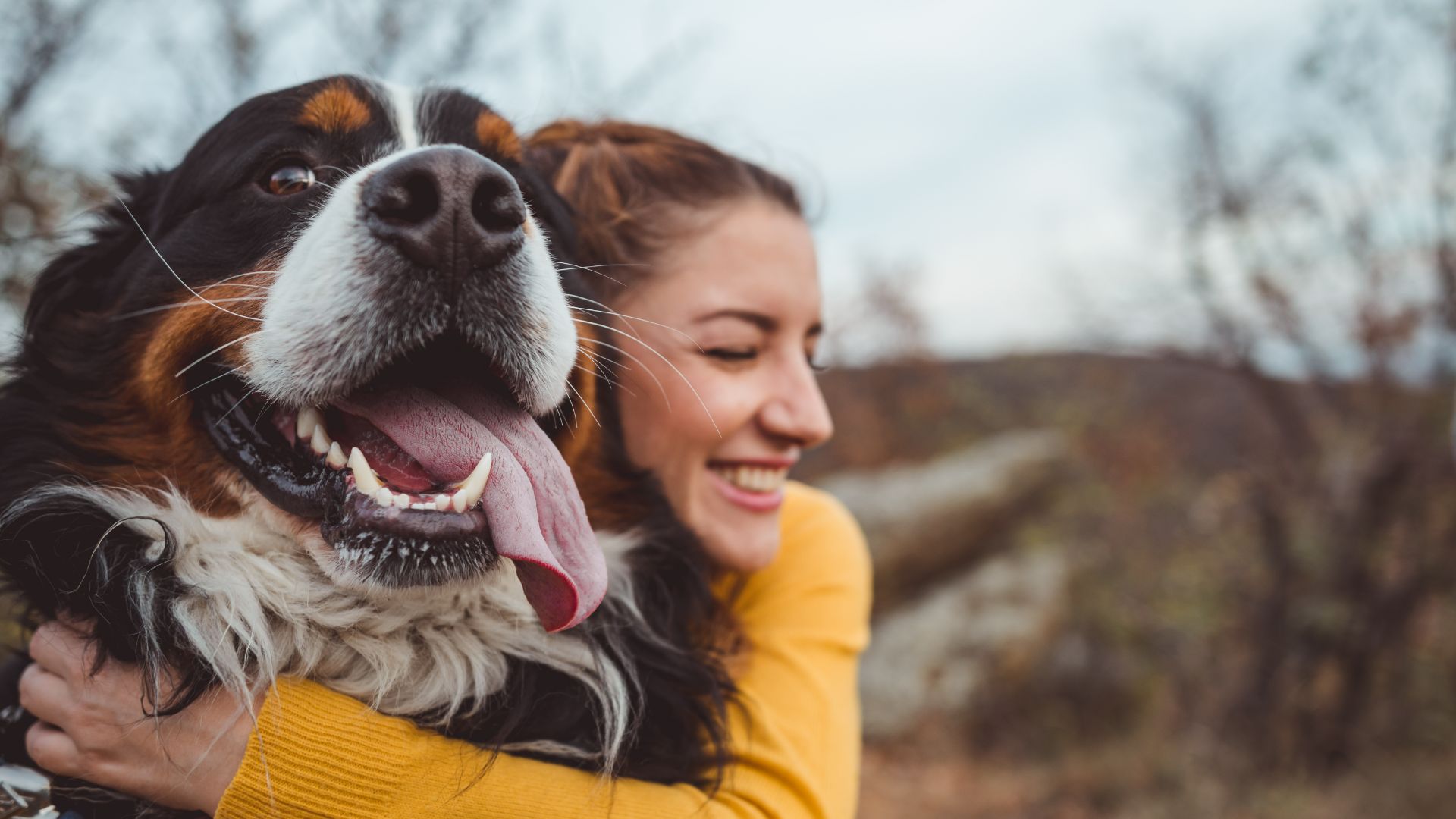
For thousands of years, humans and dogs have coexisted, roamed together, and lived side-by-side. Across the world, Canis familiaris has become an integral part of human society, and many of us deeply love our canine companions.
We can express our love and affection for our puppy pals in several ways, like doling out treats and the best puppy toys, giving snuggles and belly rubs, taking them on dog-friendly adventures, and providing for their enrichment, nutritional, health, and social needs. But, what are the ways your dog shows they love you? Like humans, dogs can express their affection in a variety of ways that range from quietly sharing space with their favorite people to high-energy displays of joy and playfulness.
Below, we’ll check out some of the many ways your dog shows they love you.
32 ways your dog shows they love you
1. Excited greetings when you come home
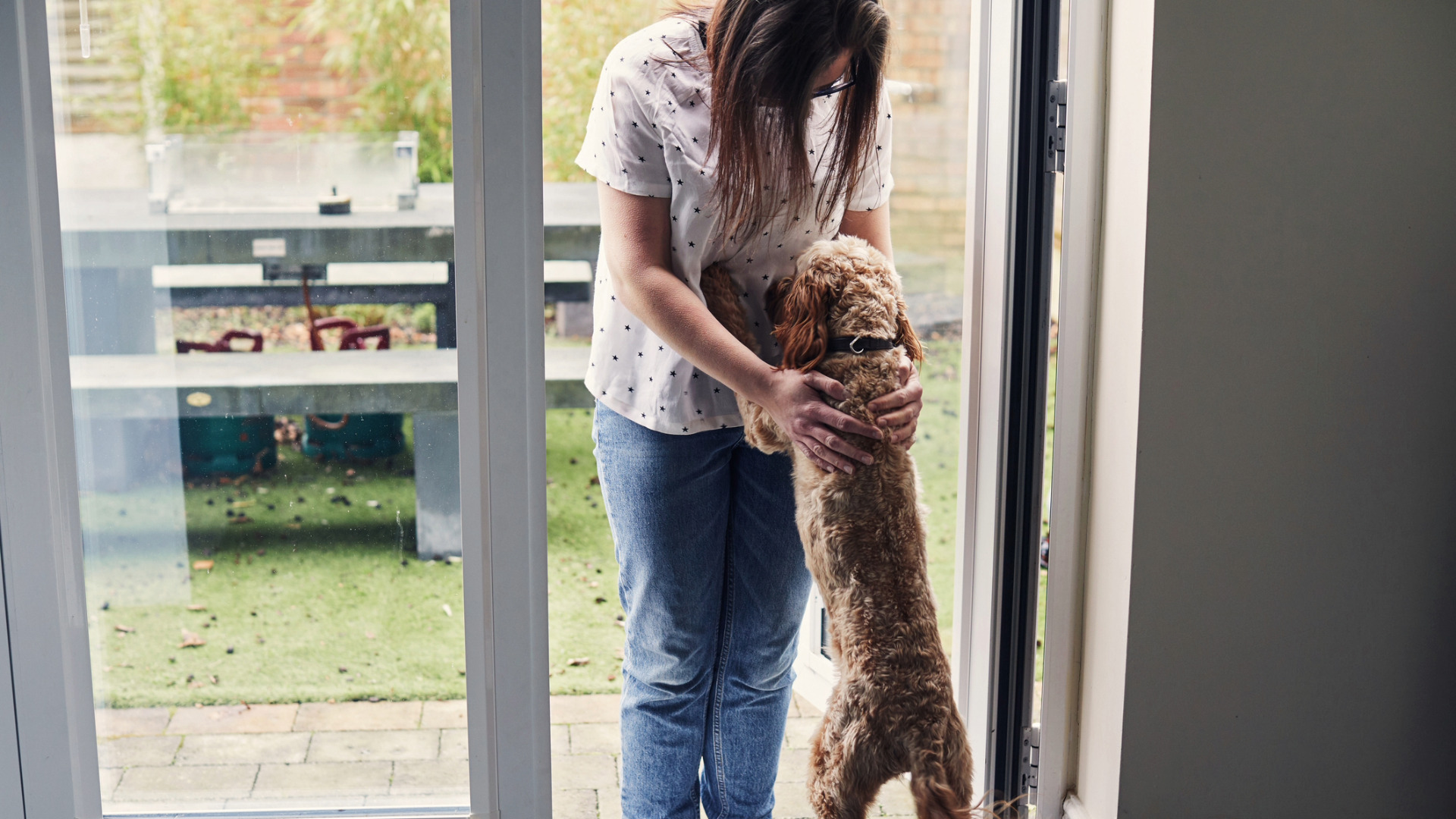
When you come home from work, errands, or an outing, your pup may excitedly greet you at the door. Exuberant greetings from your dog are especially common if you’ve been gone for several hours and are one of the many ways your dog shows they love you.
For dogs whose cherished humans work away from home, seeing their person step through the front door is often the most exciting moment of the day. It’s important to note that if the greeting is consistently frantically excited, and your dog has difficulty calming down when you arrive home, this may be a sign of separation anxiety.
2. Happily sharing space
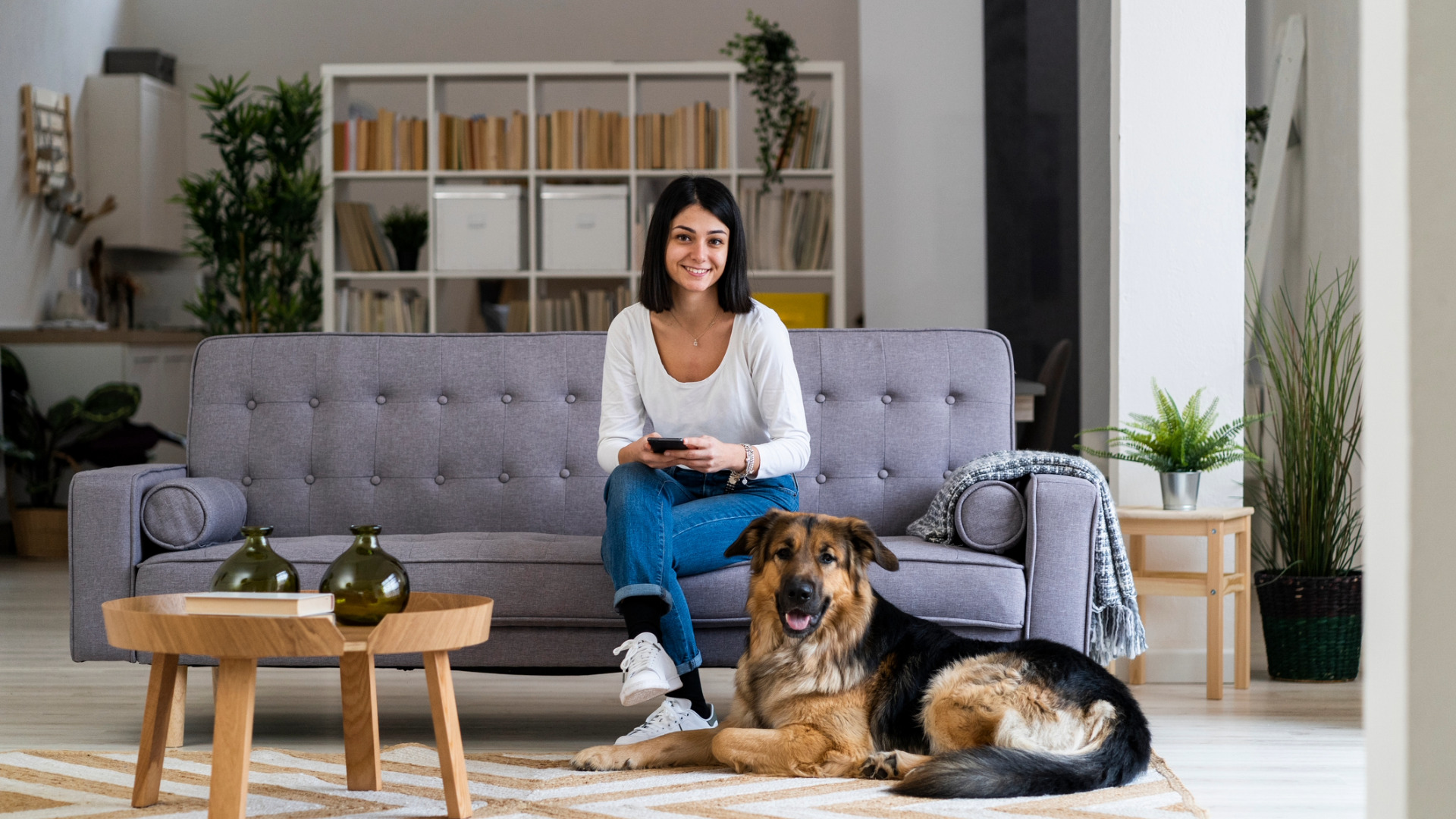
As social animals, space sharing is one of the ways dogs express their love, and dogs who love their human companions are happy to share space with them. For a dog who has a more aloof personality, rather than leaping into your arms, they may show their affection by contentedly hanging out in the same room as you while napping or chewing on some of the best dog toys. By choosing to be near you, your pooch is communicating their trust in and attachment to you.
3. Snuggling
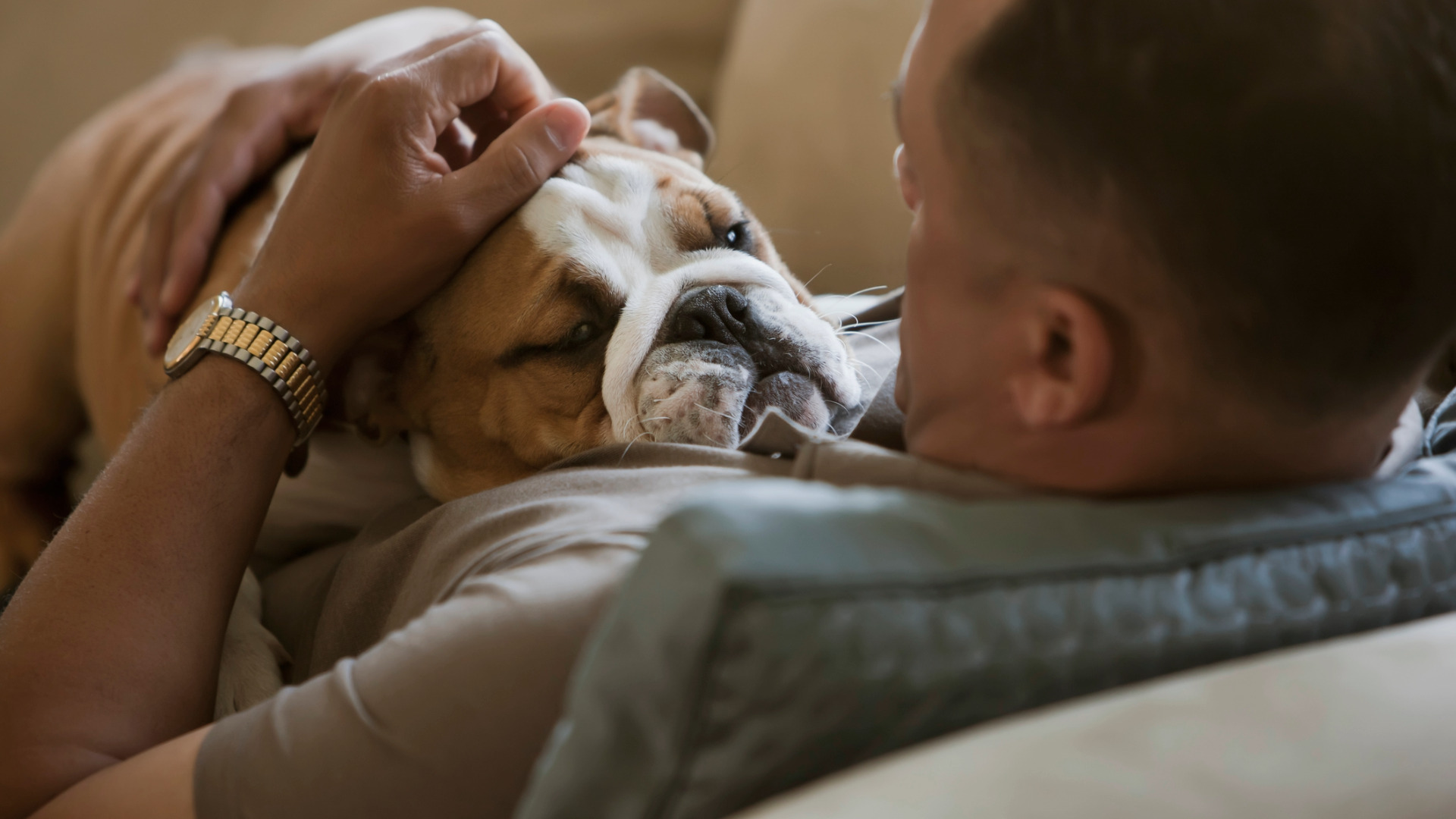
Some pups show their affection by snuggling up with their favorite people. Dog snuggles can take on a variety of forms depending on the size, personality, and early life experiences of the pups.
Depending on their size and comfort level with close contact, a snuggly pooch may curl up in your lap, lay their head on you, hop into your arms, lean against you, or stretch themselves across you. You might also have a particularly large snuggly pup who comically insists on being a lap dog.
4. Sleeping near you
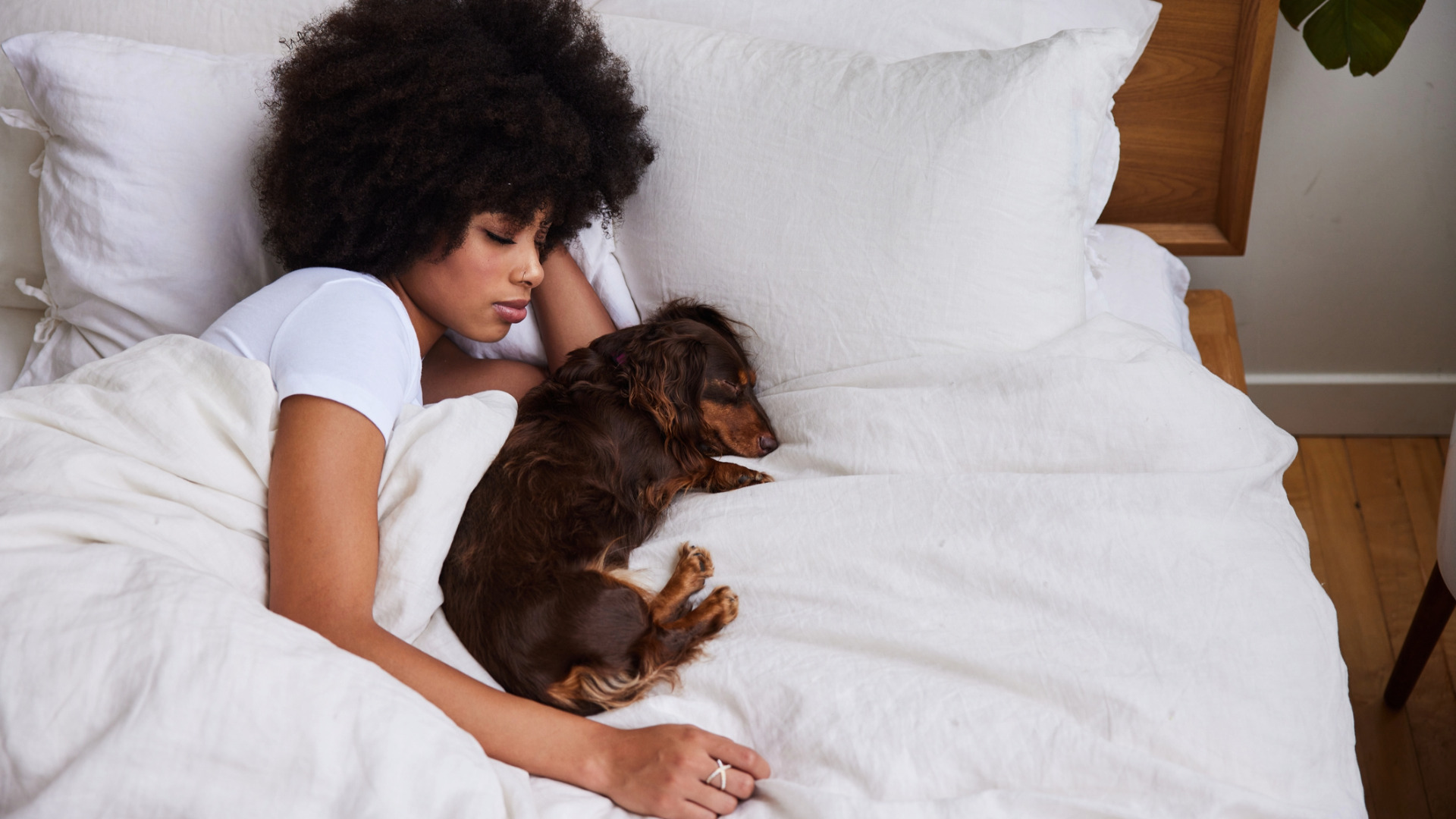
If your canine companion sleeps near or against you, they are displaying a deep trust and bond. Since they love you and feel safe in your presence, your dog can drift off into a relaxing slumber with you by their side. Some pups prefer to sleep on your bed while others are happy to sleep on the floor in one of the best dog beds. If you do welcome your pooch to share your bed, they may be inclined to sleep near your head or curled up at your feet.
5. Bringing you toys
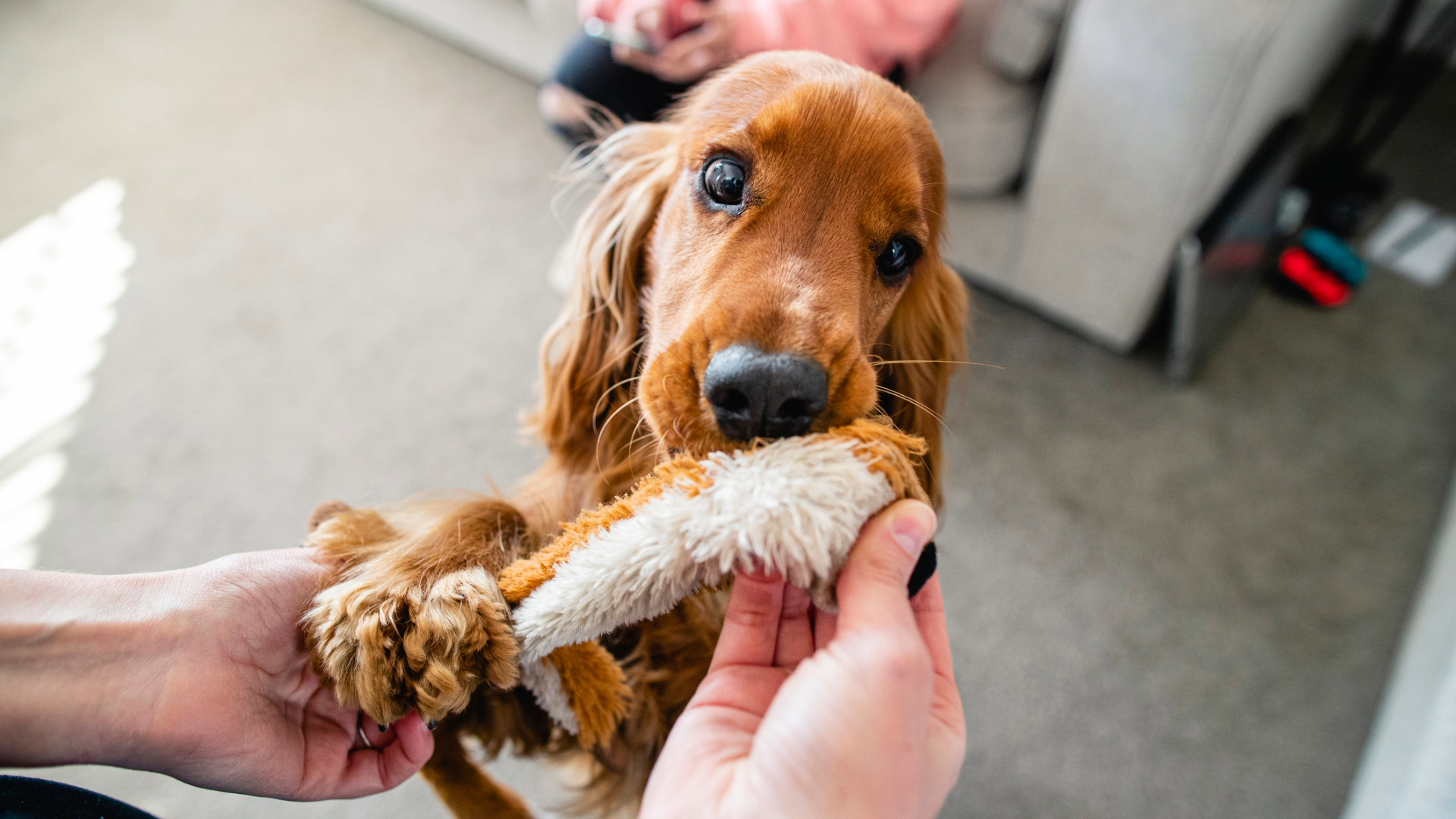
One of the cutest ways dogs show they love you is by bringing you their toys. They may do this to initiate a game of tug or fetch, or they may simply wish to share one of their cherished items with you as a sign of affection. If your dog brings their toys to you, this is also a sign that they feel safe and comfortable sharing their resources with you.
Due to negative early life experiences, punishment-based training, or even genetic predisposition, some pups don't feel comfortable sharing their resources. If your normally loving pup defends their toys from you, we recommend contacting a force-free certified behaviorist or trainer to help your pup feel safer and more comfortable sharing their cherished items, like one of the best dog chew toys.
6. Leaning on you
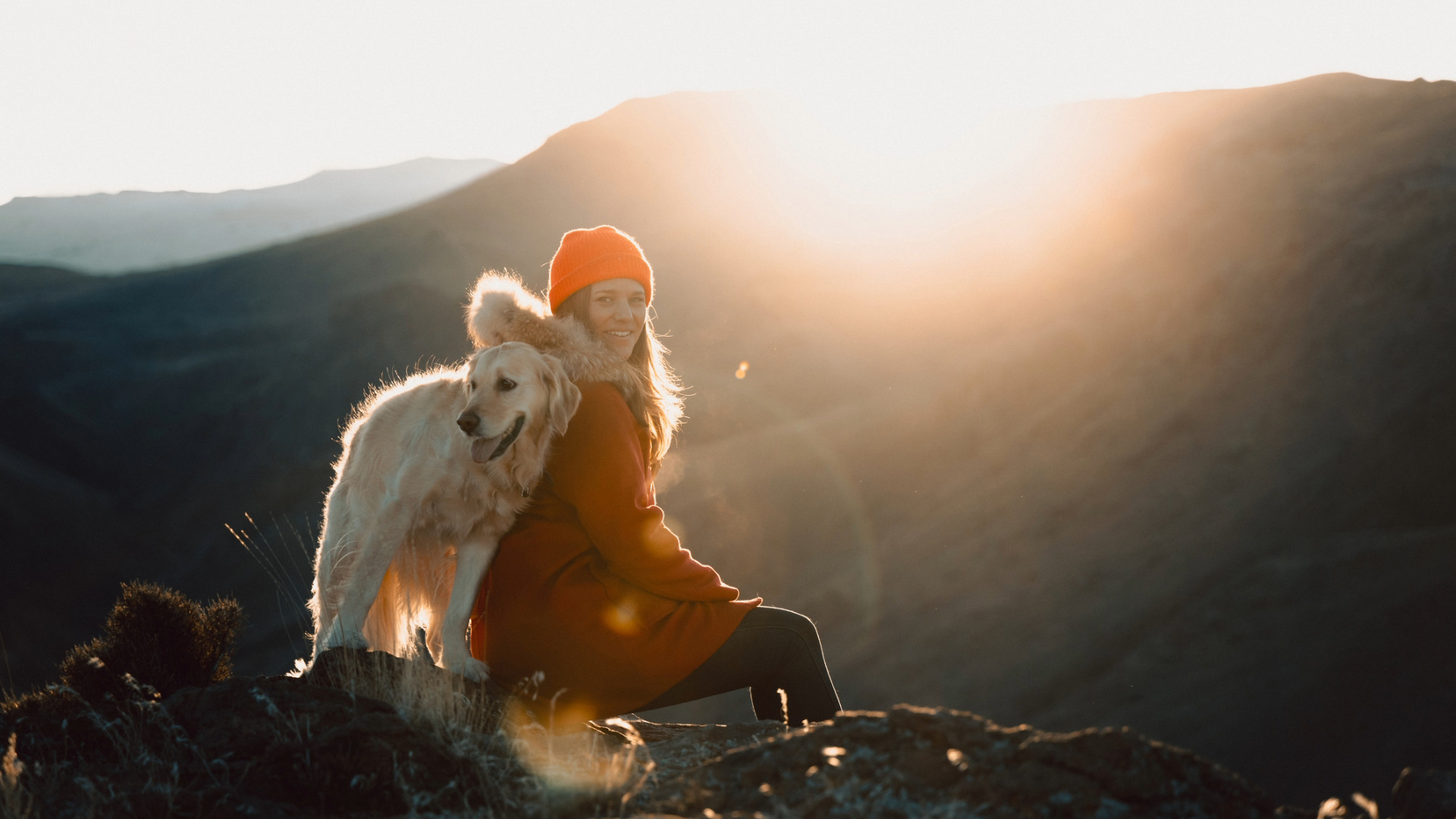
Some doggos will lean their full weight against you as a sign of affection or request for scratches, pets, and hugs. Note that some dogs don’t appreciate hugs, so if you hug your pup, watch for any body language changes that may indicate stress.
These signs can include yawning, quickly and tightly licking their lips, leaning away from the hug, looking away, and wide eyes. Conversely, a pooch who enjoys hugs will not have tense body language and a relaxed facial expression.
7. Nose nudging
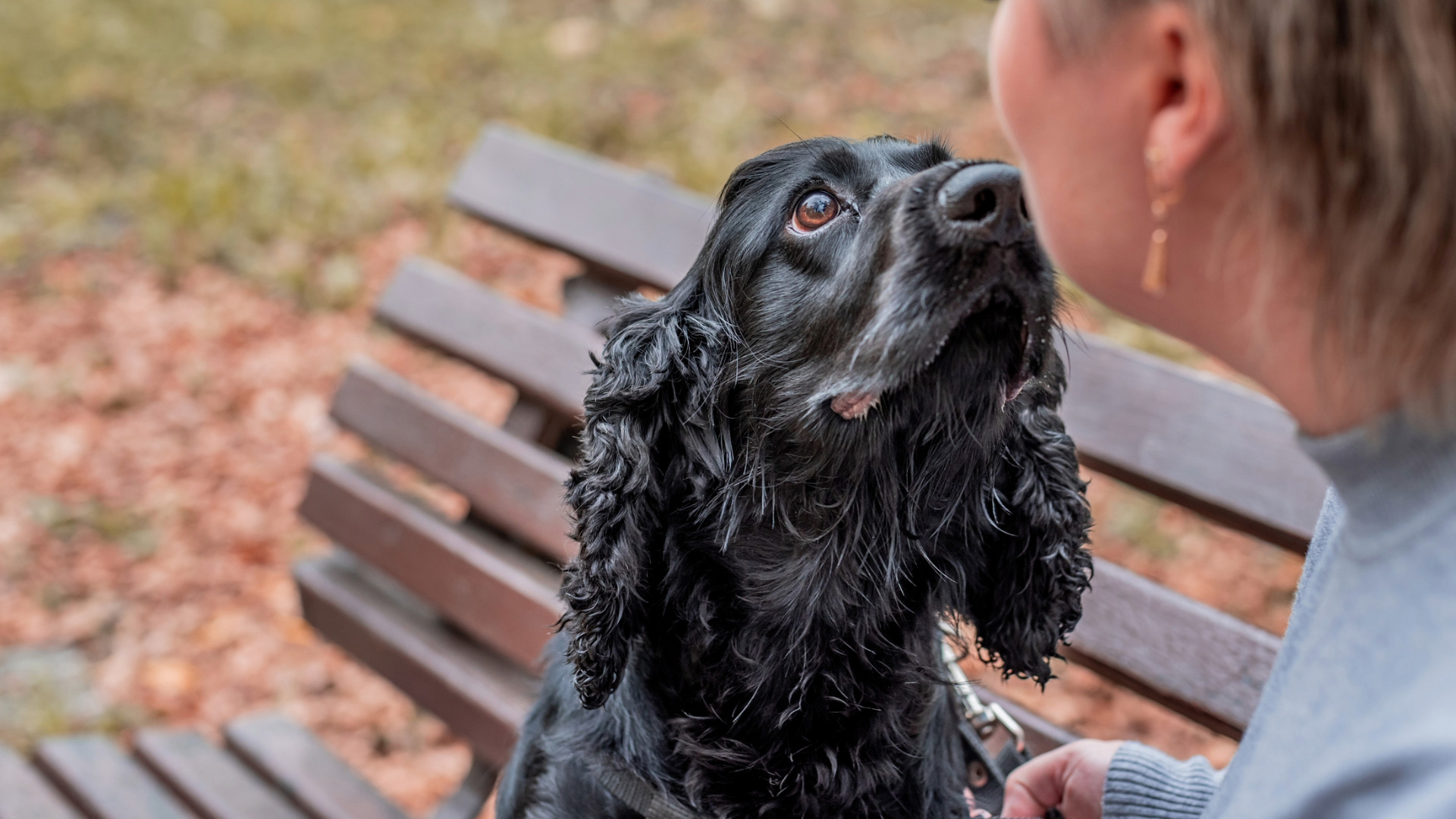
Dogs may request attention and affection from their beloved human pals by nose nudging. These pups will often use their nose to nudge your hand, under your arm, or against your leg. Some pooches can be quite adamant about their nose nudging when seeking affection from the people they love.
If your pup is constantly seeking affection in this way, we recommend considering if they might be experiencing anxiety that they're seeking comfort for, or if they may need additional social enrichment to feel content.
8. Relaxed body posture
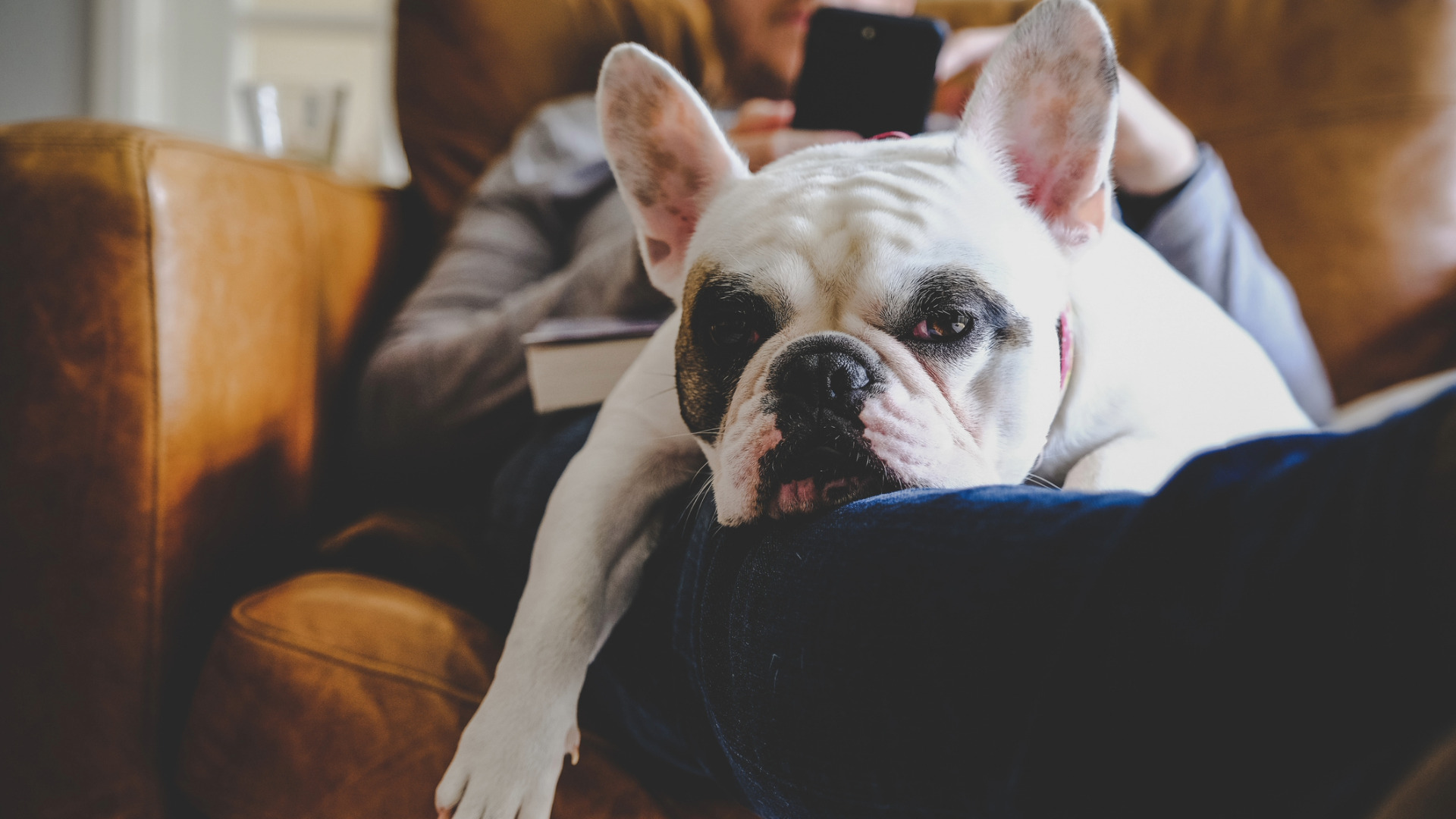
A relaxed body posture can be a more subtle sign that your dog loves you. Some pooches have difficulty feeling calm and safe in our busy, modern world. If your dog fits this description, but display a loose, calm, and relaxed body posture around you, this means they feel safe and assured in your presence.
One of the best things we can do when raising a pup is to make sure they feel safe and secure with us, especially in new or potentially stressful environments.
9. Happy tail wags
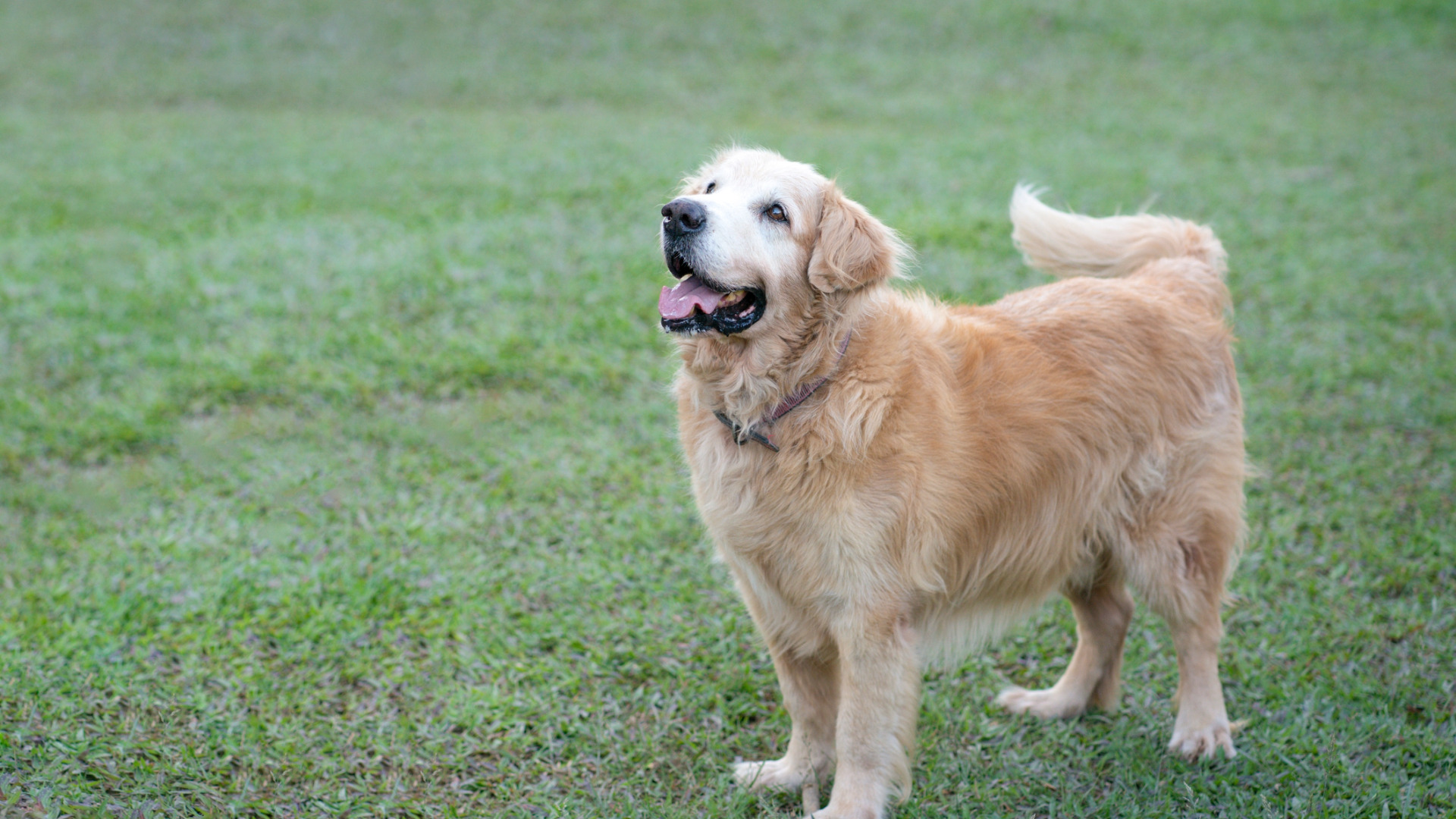
Tail wagging has a variety of meanings for dogs, depending on the speed, position, and direction of the wag. When your dog uses a broad, loose, and right-sided sweeping or circling wag, this usually means they are happy to see you!
According to a 2007 study published in the journal, Cell Biology, wagging to the right often indicates a positive emotion, whereas left-sided wagging can indicate an unsure, cautious, or anxious emotional state.
10. Joyful jumping
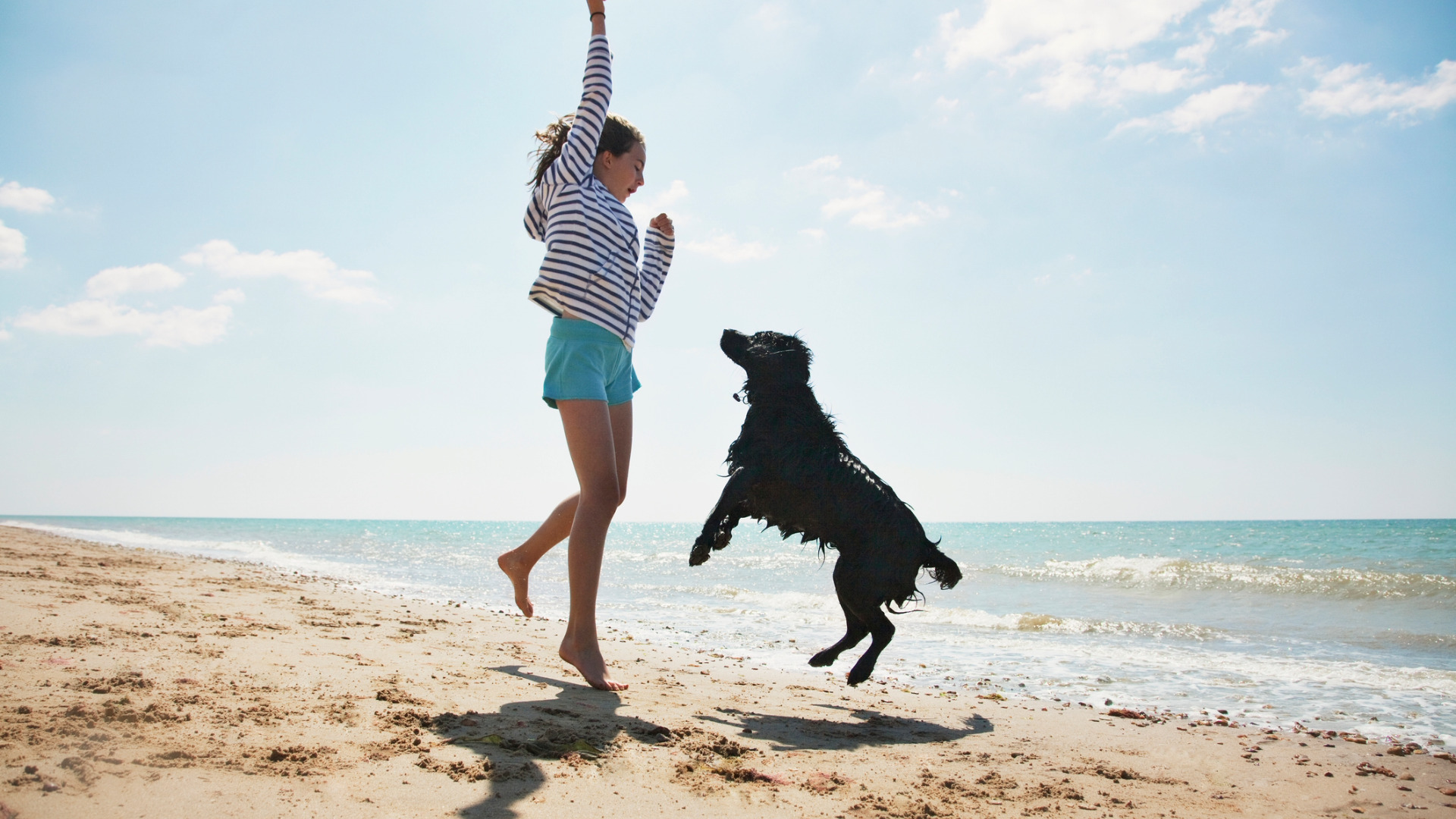
Some high-energy doggos might use jumping to express their affection for you. They may jump on you or jump around near you. This type of joyful jumping is usually loose and wiggly, as opposed to tense.
If you'd prefer your dog not to jump on you so much when they're happy, it's important to help them develop an alternative behavior that allows them to express their joy without pummeling you in the process. Some folks who have dogs that jump on them the second they walk in the house teach their pooches to grab a toy from a basket right next to the door instead
11. Eagerly following you
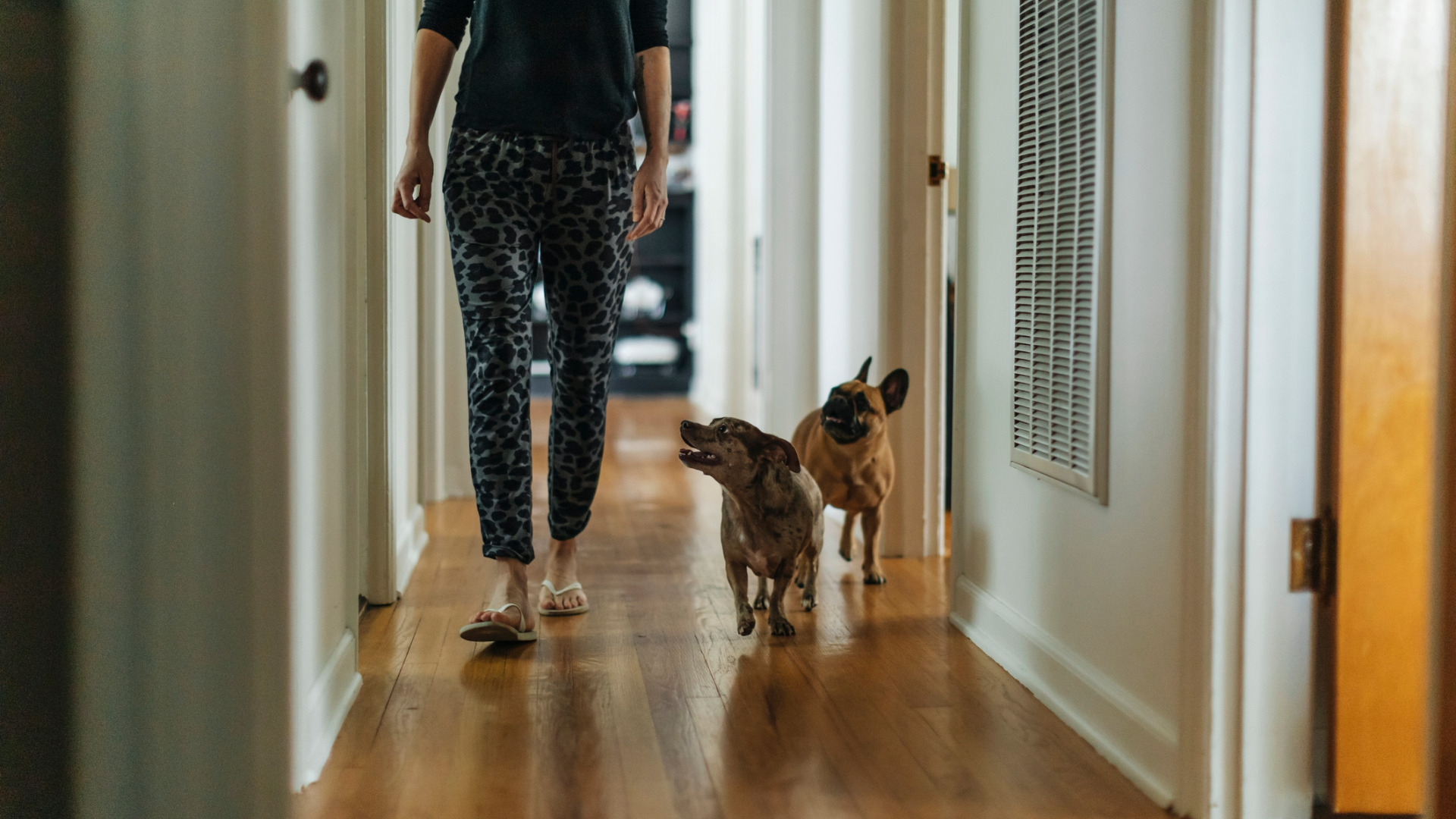
If your pooch happily follows you around the house or on outings, this indicates attachment and trust. However, it’s important to note that frequent following can be a sign of separation anxiety if your pup becomes distressed when they are unable to follow you or insists on being your shadow throughout the day.
If this is the case, a separation anxiety specialist can help you learn how to reduce separation anxiety in dogs.
12. Using soft, gazing eye contact
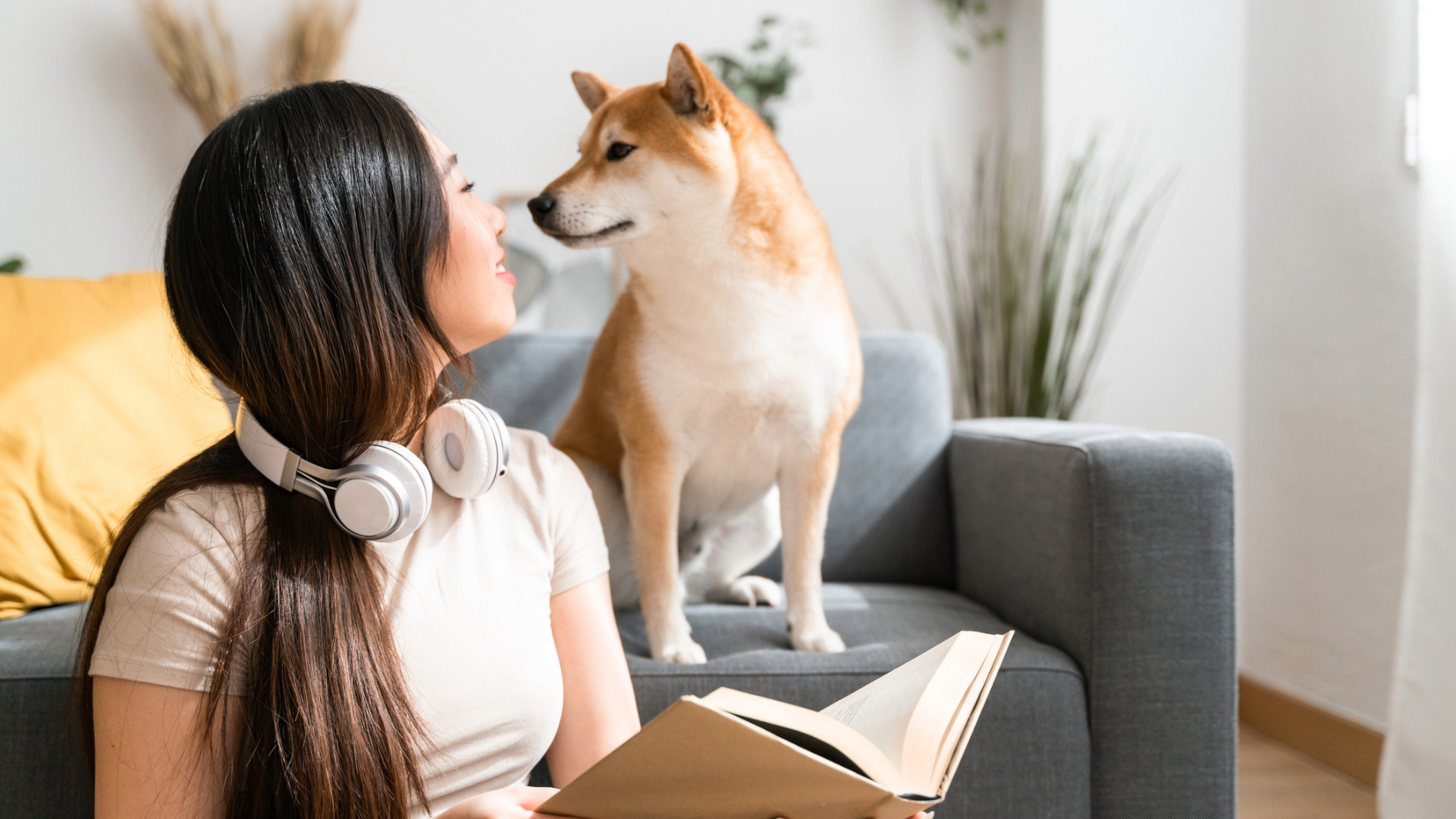
Some dogs don’t enjoy eye contact, while others may love gazing into your eyes. When your dog uses eye contact to show affection, their expression is usually soft and relaxed or bright and excited. Don't worry if your dog doesn't want to make eye contact with you. Just like some of us humans, some pups aren't comfortable holding eye contact and that's totally OK. As this list shows, there are varying ways individual doggos can express their love for their people.
13. Engaging in play
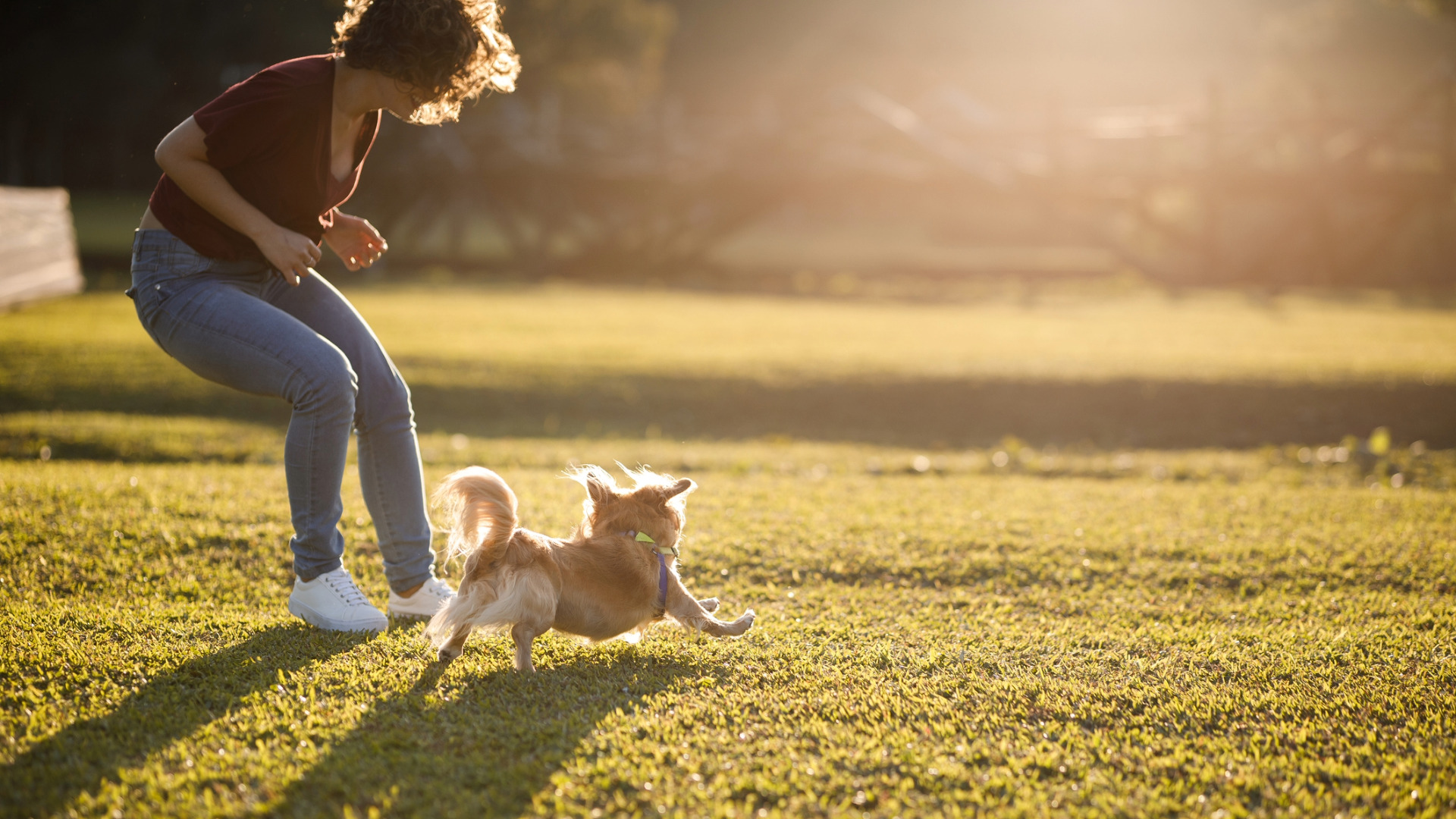
If your pup is rambunctious, they may use various forms of play with you to express their affection. These types of play can include rough-housing, silly movements, fetch, tug, and playful pawing. Sometimes, our dogs are a bit too rough and rowdy when expressing their affection for us.
In this case, you can help re-direct the rough-housing energy into a game of tug or fetch with one of the best rope dog toys. It can be tempting to try to simply ignore or walk away from your pooch if they're playing too rough with you, but it's also important to show them what we want them to do.
14. Returning quickly when you call
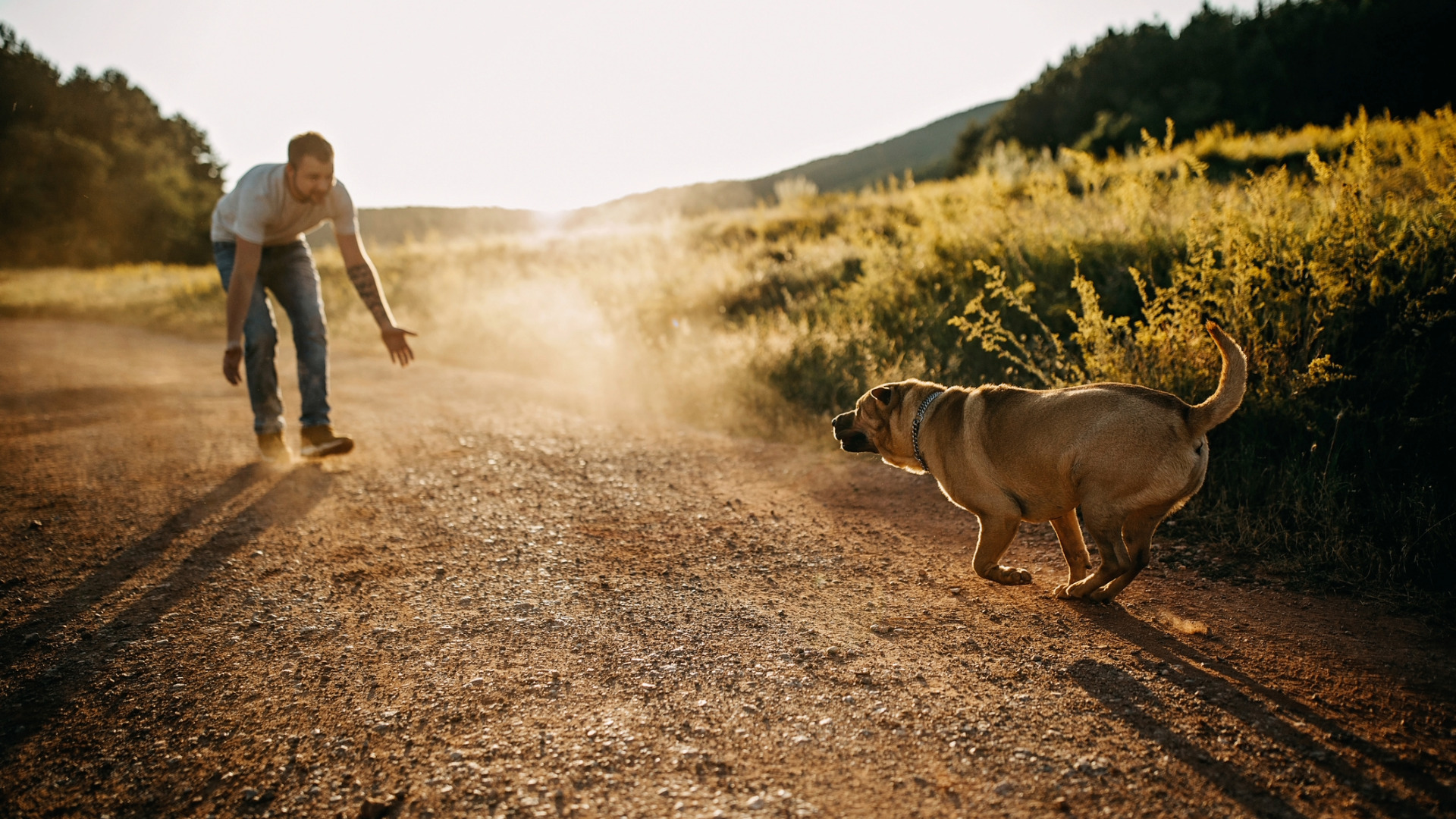
If your dog frequently comes bounding over to you when you call, this can be a great reflection of your dog's love for you. This is especially true if you use only force-free and relationship-based training. Of course, some pooches can become intensely interested in their environment and have a difficult time returning to their guardian even if they adore them.
A force-free, positive reinforcement trainer can help guide you on using some of the best dog treats, play, choice, and your close relationship with your pup to strengthen your dog's recall.
15. Happy facial expressions
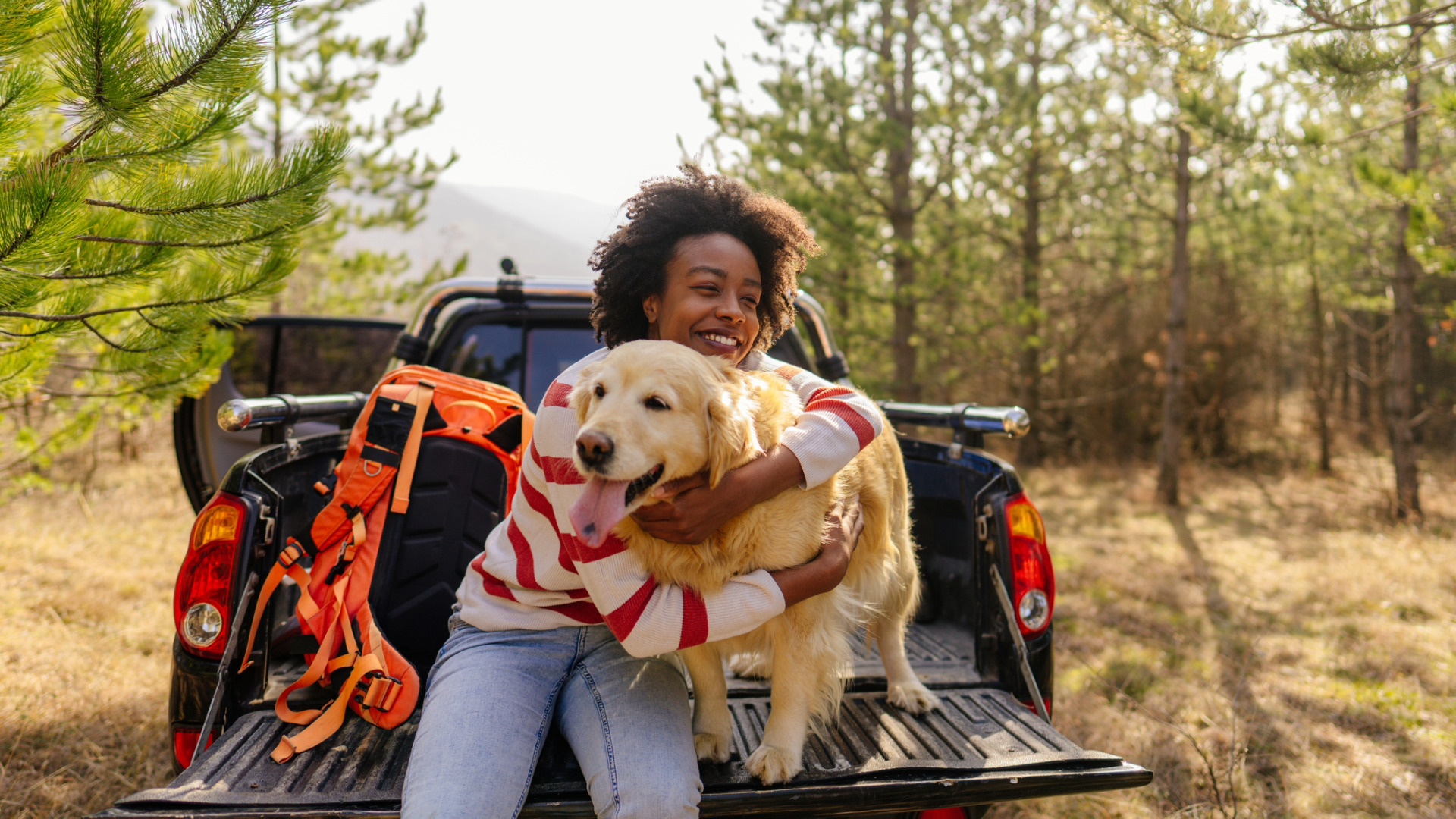
When your pup is showing affection towards you, they usually display happy facial expressions. You may notice soft and sometimes squinting eyes, a relaxed and open mouth, relaxed ears, and a lack of overall tension in the face.
A happy smile will defer greatly in appearance from anxious panting or defensive teeth baring. This is especially true when you take the overall expression of your dog into account. A happy, relaxed face should match loose or wiggly body language.
16. Content sighing
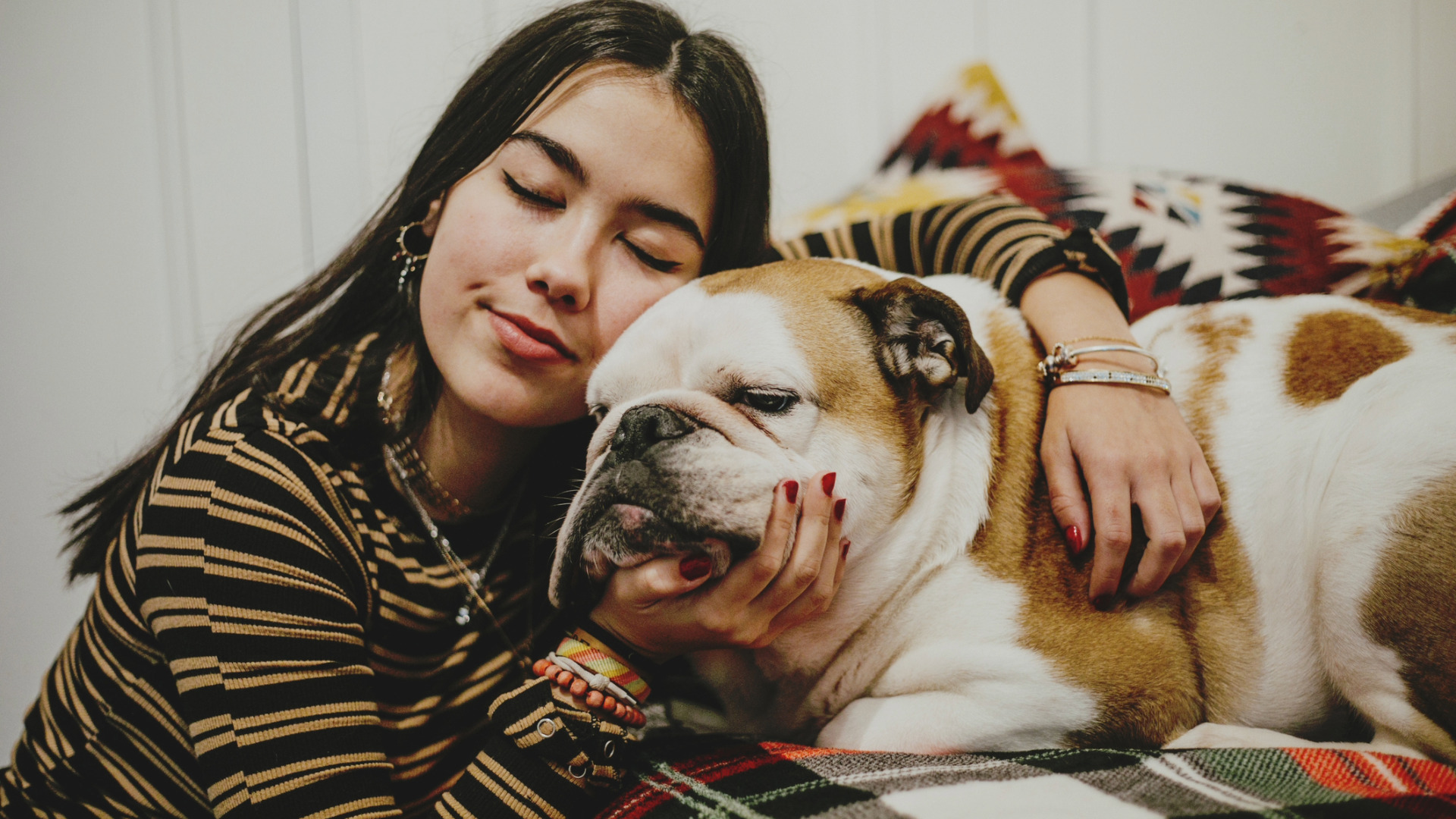
Like us humans, dogs can sigh when they're happy. A dog who loves you will be able to feel safe in your presence. A relaxed and secure pup might give a long, deep sigh while they're resting near you. This sign, like many on this list, may not be directed at you as an explicit sign of affection.
Instead, a content sigh in your presence is a reflection of you and your dog's close relationship. Recognizing these more subtle positive signs can be especially useful for people with pups who are a bit more reserved in their behaviors.
17. Contented licking
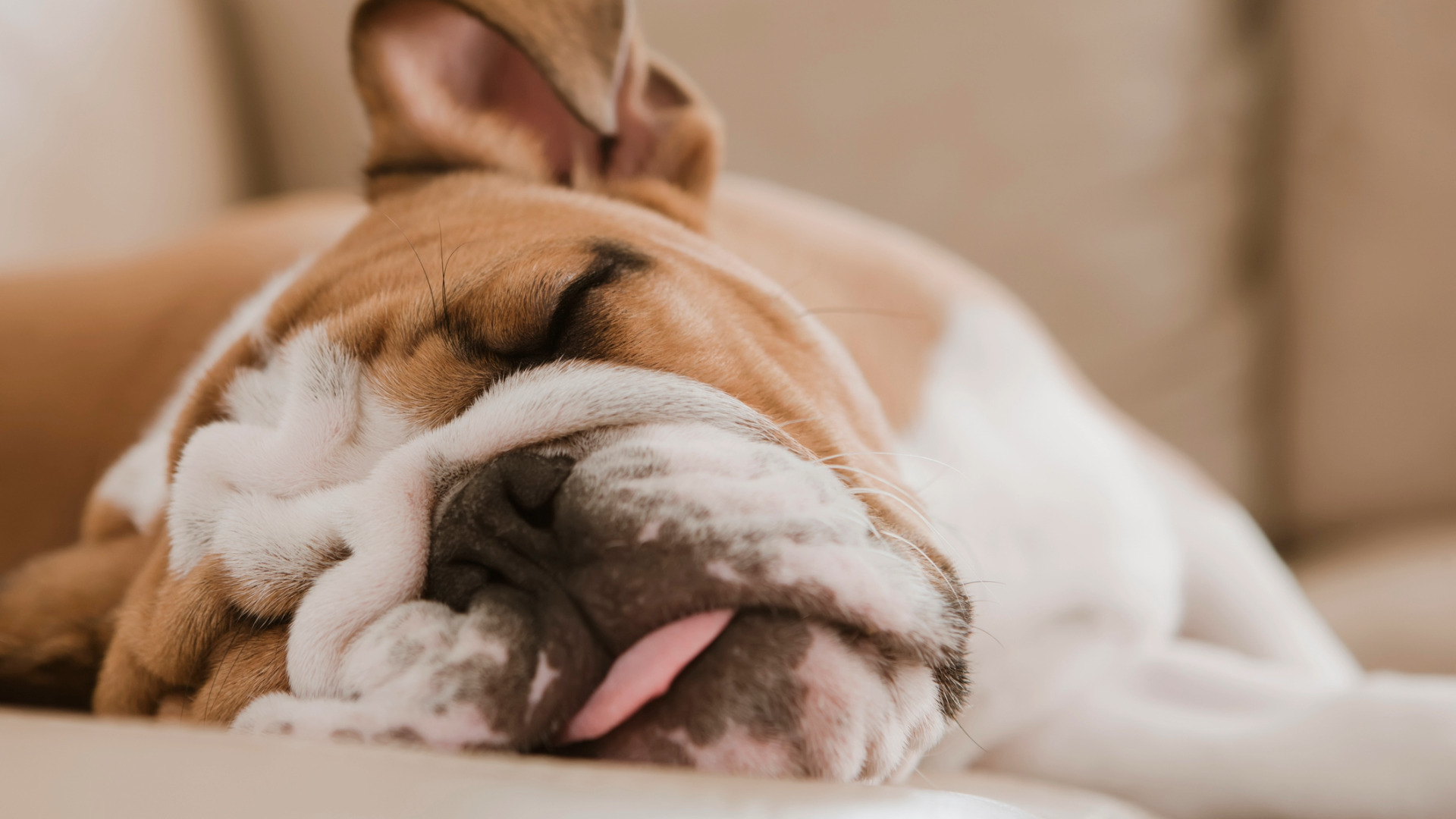
When content, your doggo might smack their lips with a long, slow lick. This relaxed licking can be a sign of feeling happy and safe in your presence. A happy lick is much different from a nervous or appeasing lick.
The latter is typically tight and short against the muzzle. It may be accompanied by a yawn, anxious whine, and wide eyes. A happy lick, in contrast, is usually accompanied by relaxed body language and usually occurs in a low-energy environment.
18. Asking for belly rubs
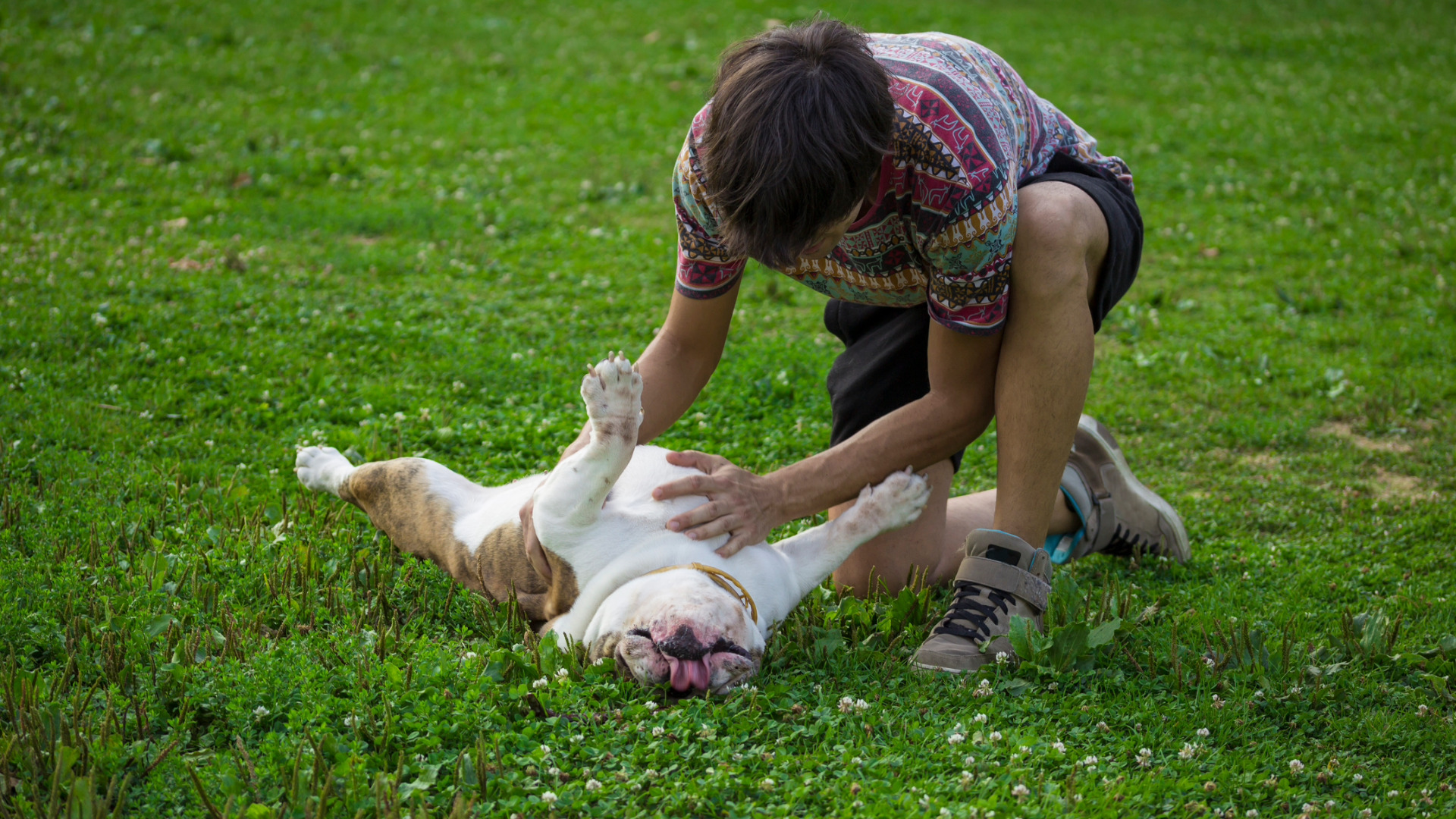
Why do dogs love belly rubs? Some pups are absolute fiends for belly rubs, especially from their favorite human. However, rolling onto their belly can also be a sign of appeasement and request for space, so it's important to understand the difference. If your pup is asking for belly rubs, they'll usually lazily flop over with their front fully bent at the wrist.
Their body language won't be tense and they'll display a relaxed facial expression. An appeasing roll usually looks more guarded and the dog will often have a nervous facial expression.
19. Grabbing their toys or your items when you come home
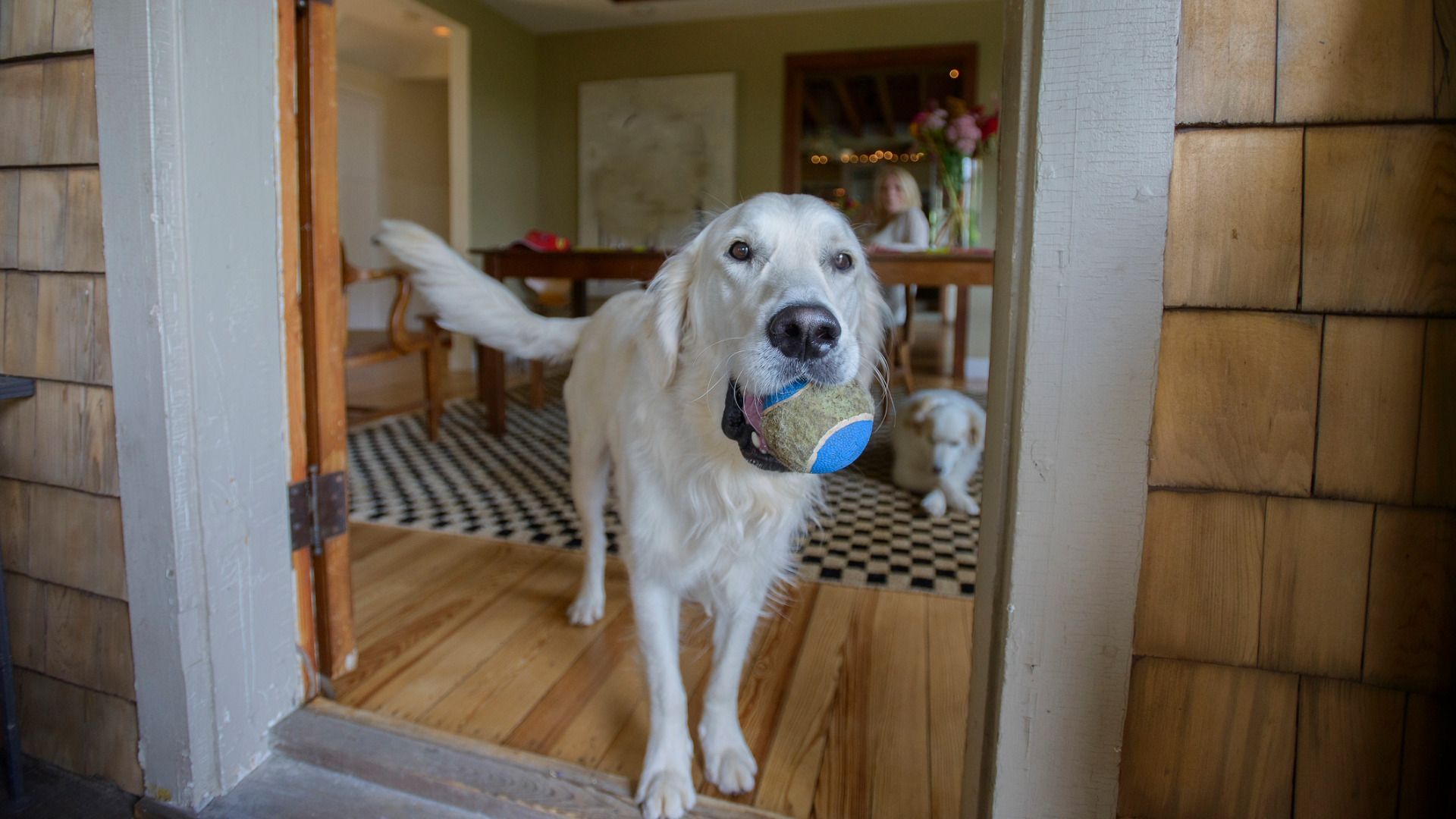
Adorably, some pups pick up their favorite toys or items when their person returns home. This sign of affection usually involves a lot of wiggling around while they carry a cherished item such as one of the best dog puzzle toys or your shoes.
In this instance, your dog won't usually try to give you their toy. Instead, they'll often parade and wiggle around while carrying the item in their mouth as an expression of their joy. If your dog can be jumpy but also likes to carry toys, this can be a great behavior to encourage when they're excited as opposed to jumping on you.
20. Happy vocalizations
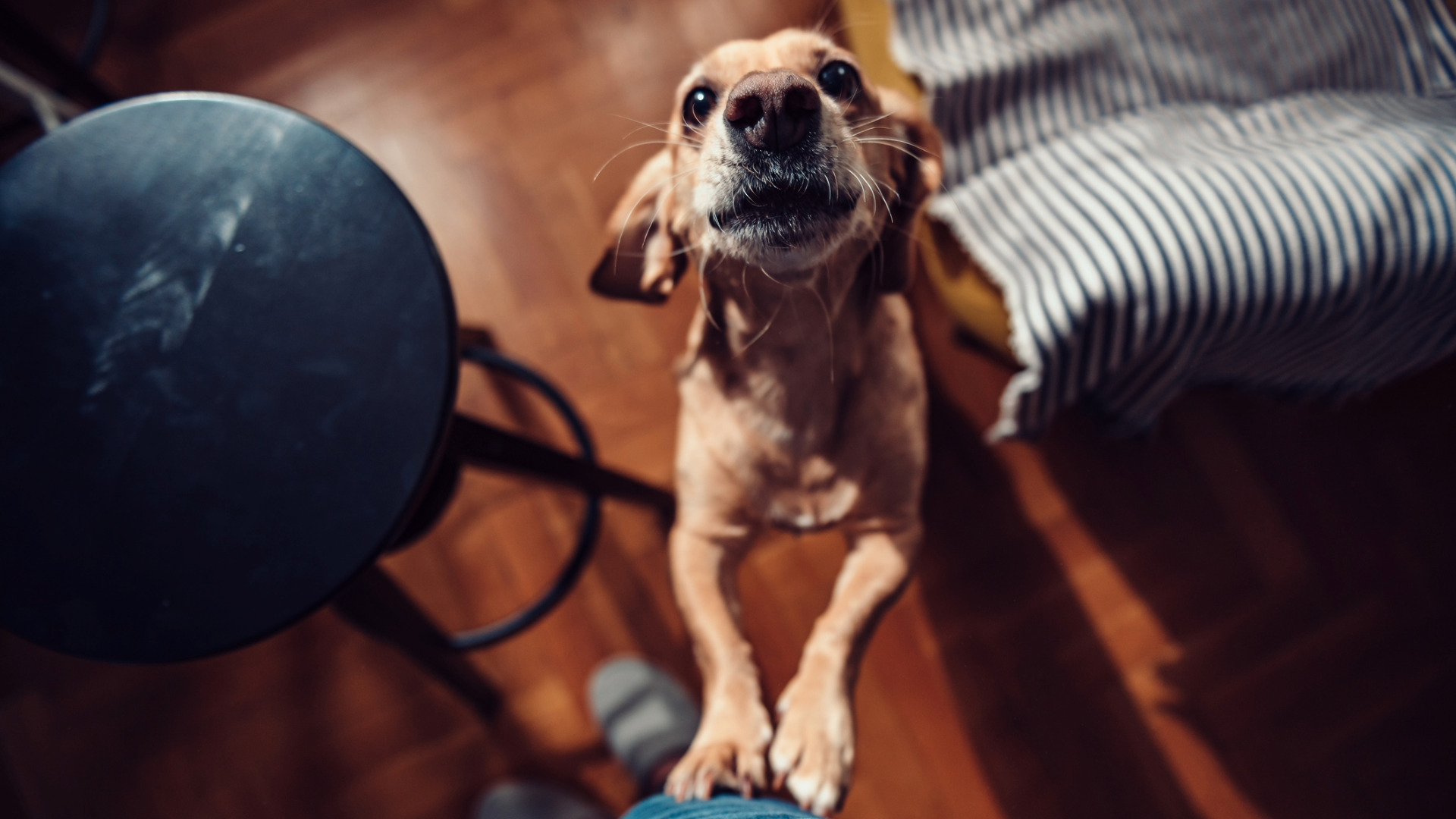
Some dogs are quite vocal and will make all kinds of happy sounds to express their affection and joy. These vocalizations often sound like happy growls, grumbles, or howls. Some folks may mistake these vocalizations as a sign of aggression or defensiveness, but many dogs also make growl-like noises when they're happy. As always, looking at the larger context of the environment and the dog's body language can help differentiate between a defensive growl and a happy grumble.
21. Carrying items around that smell like you
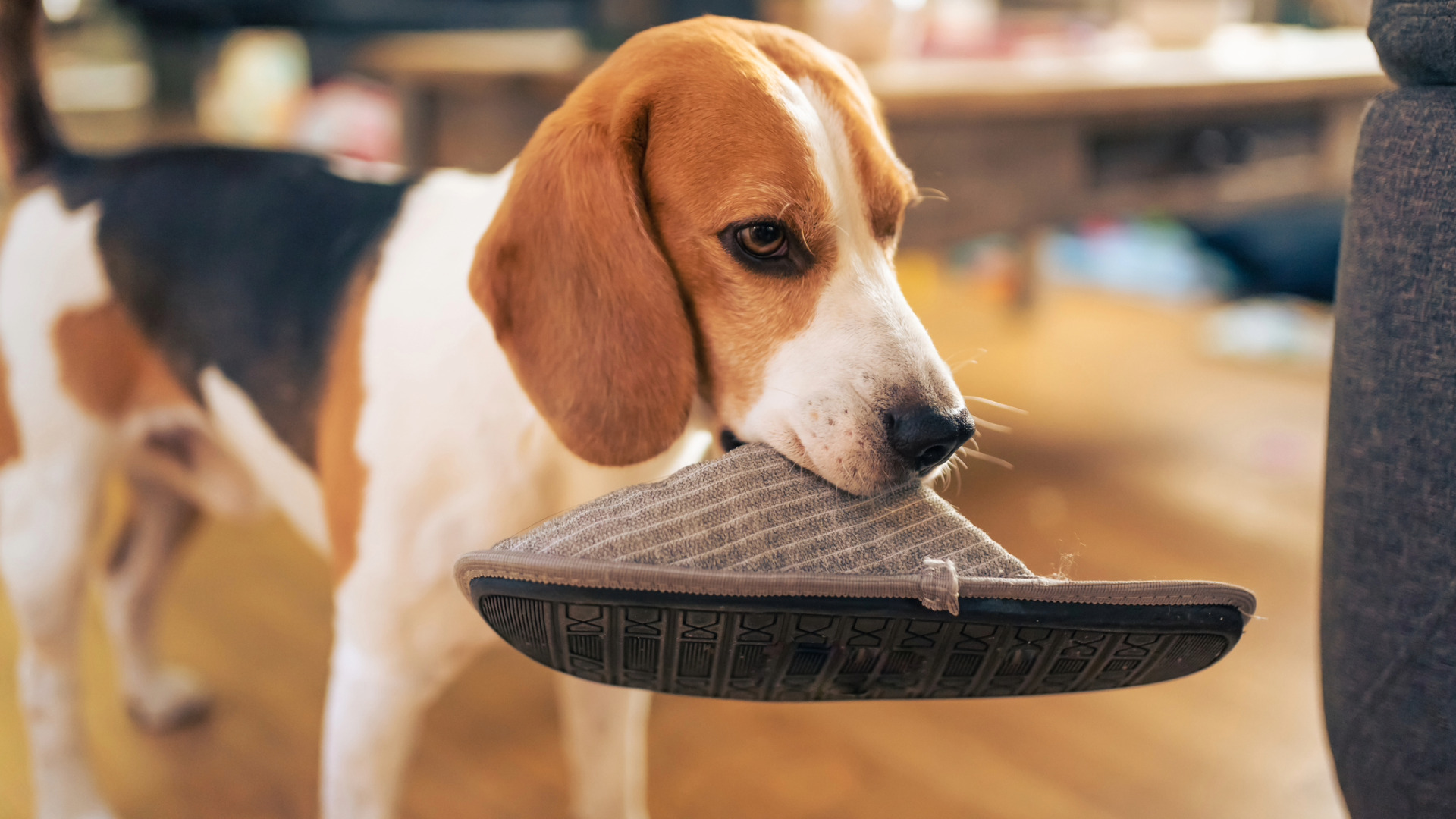
Dogs are highly scent-based critters and may associate certain smells with positive emotions. Your pup might love to carry around your shoes, blanket, pillowcase, shirts, etc. You may notice that they don't chew these items, but instead just parade them around.
This carrying around of items that smell like you is a sign of your dog's attachment to you. They may do this more when you're away from home as a way to comfort themselves with your scent.
22. Preferring to eat in front of you
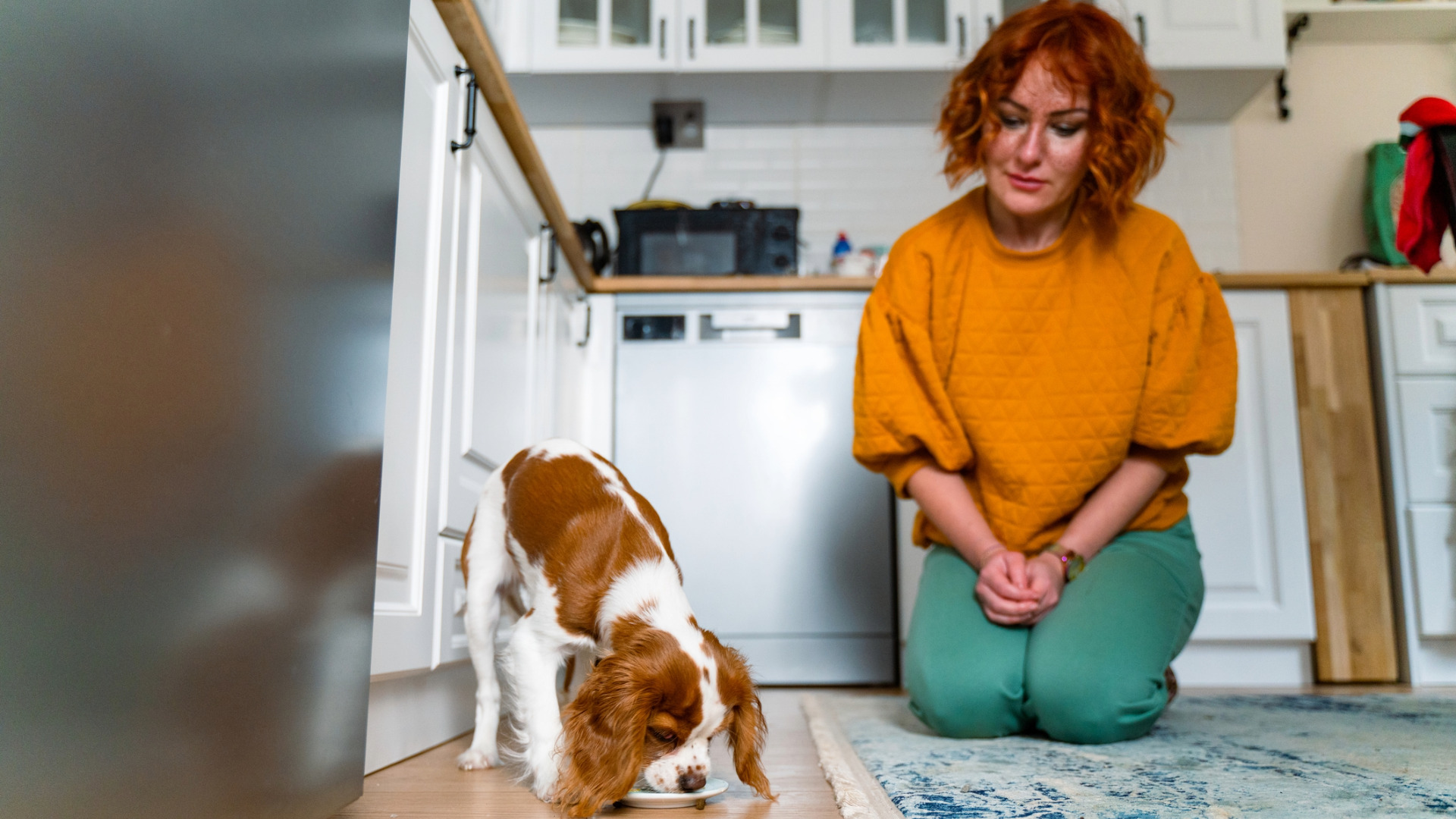
You may notice that your dog prefers to eat when you're in the same room, indicating that they feel safer and more at peace in your presence. However, if your dog won't eat without you in the room, this can be a sign of separation anxiety. You may find that your dog hasn't touched the food you put down for them before leaving for work, but they gobble it up the second you get home. In this case, it's best to intentionally hang out with them while they eat some of the best dog food to make sure they don't miss a meal.
23. Checking on you
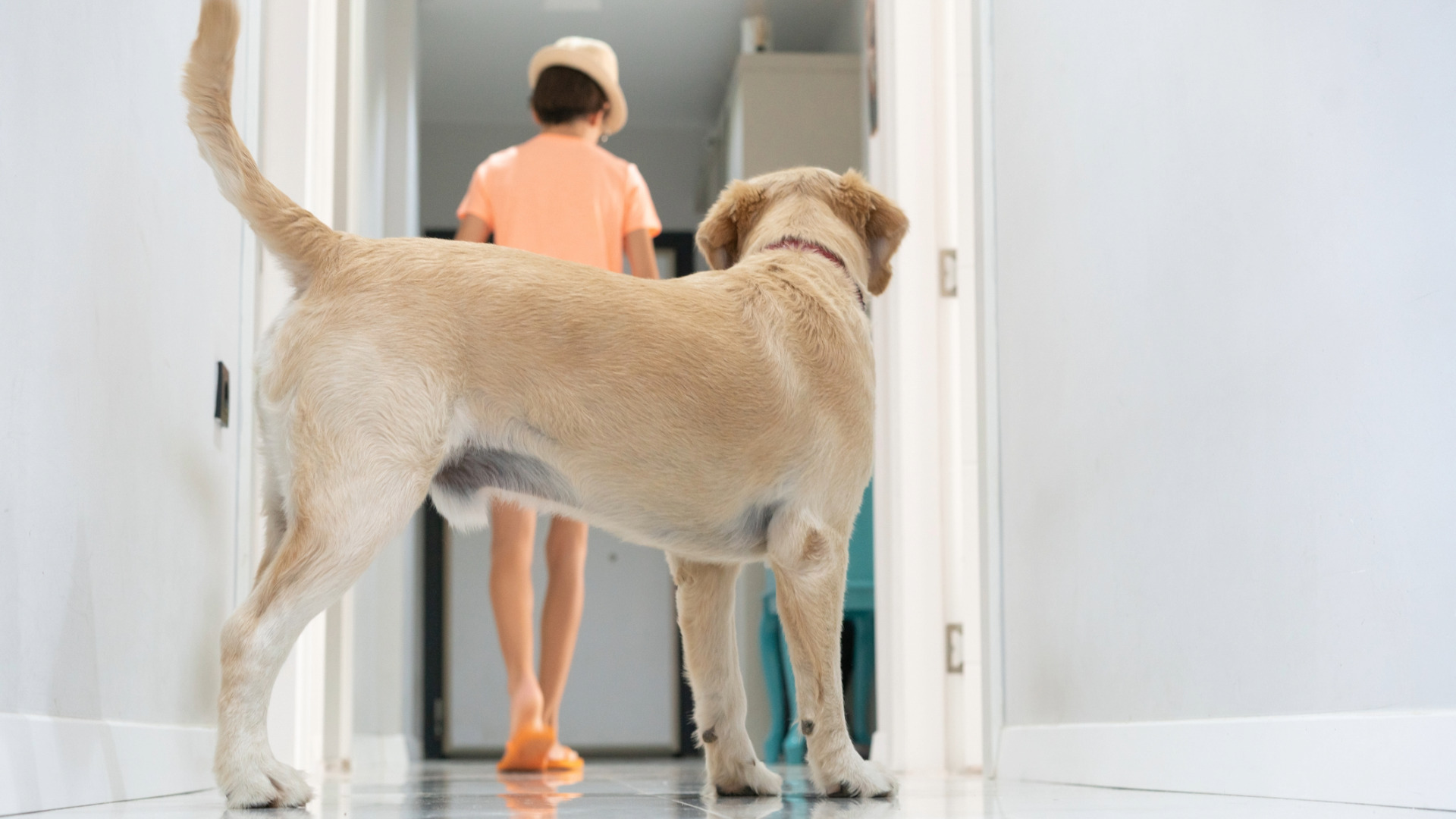
As a sign of their attachment to you, your pooch might check on you throughout the day. Instead of following you to every room, your pup may stroll in to check on you periodically before returning to snoozing in one of the best orthopedic dog beds or romping around in the yard.
This behavior shows that you're an integral part of your dog's social relations. As social animals are bred to accompany people, their mental well-being is often attached to knowing their favorite people are nearby.
24. Getting the zoomies
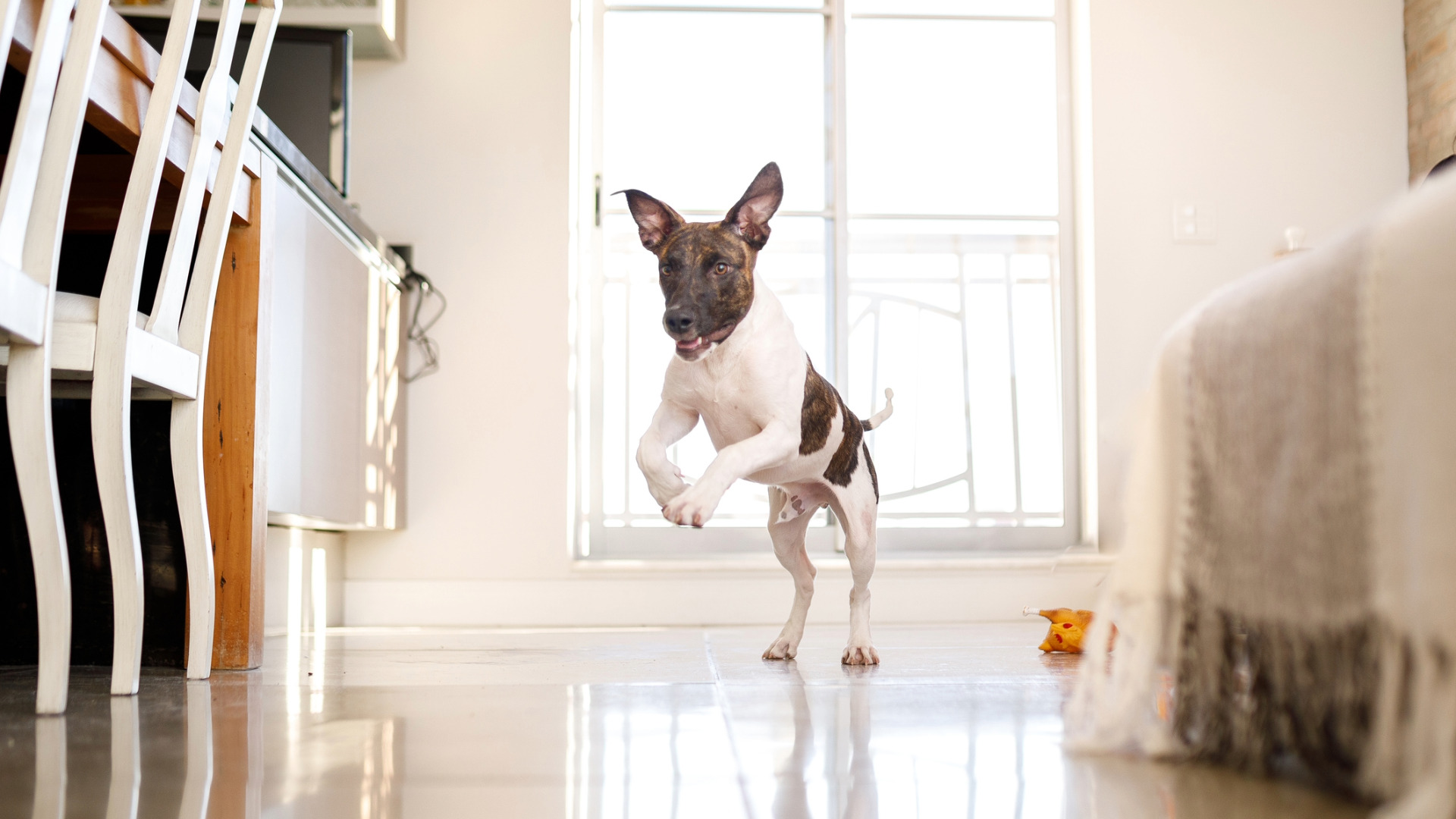
Zoomies, aka frenetic random activity periods (FRAPs), can be a sign of your dog's overflowing love for you. Sometimes, your dog might be so excited after you've come home from work that they joyfully zoom around the house or yard for a few laps.
These zoomies are a way for your dog to expend pent-up emotions or energy. Sometimes, especially when accompanied by signs of restlessness, zoomies can also be an indication of an under-stimulated dog who may need more social or mental enrichment.
25. Comfortable letting you pick up their toys
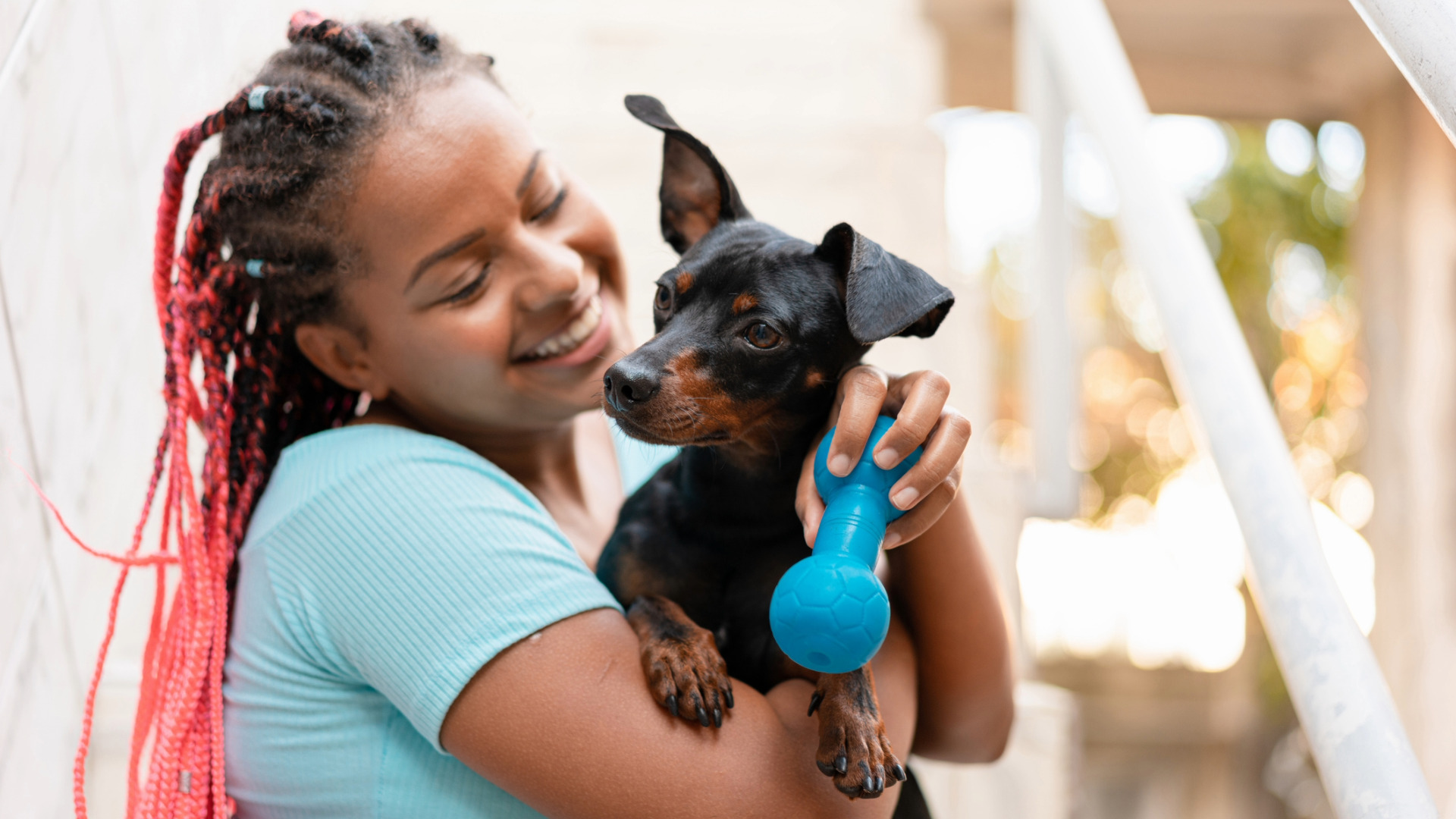
When a dog loves and trusts you, they may feel safe in allowing you to pick up their toys, bones, or other cherished items. You can maintain this trust by consistently trading a toy they have for an equally valued toy or a scrumptious treat. According to the Wisconsin Humane Society, building a habit of trading valuable items with your pup can also help prevent or be a part of treating resource-guarding behaviors
26. Staying near you in stressful situations
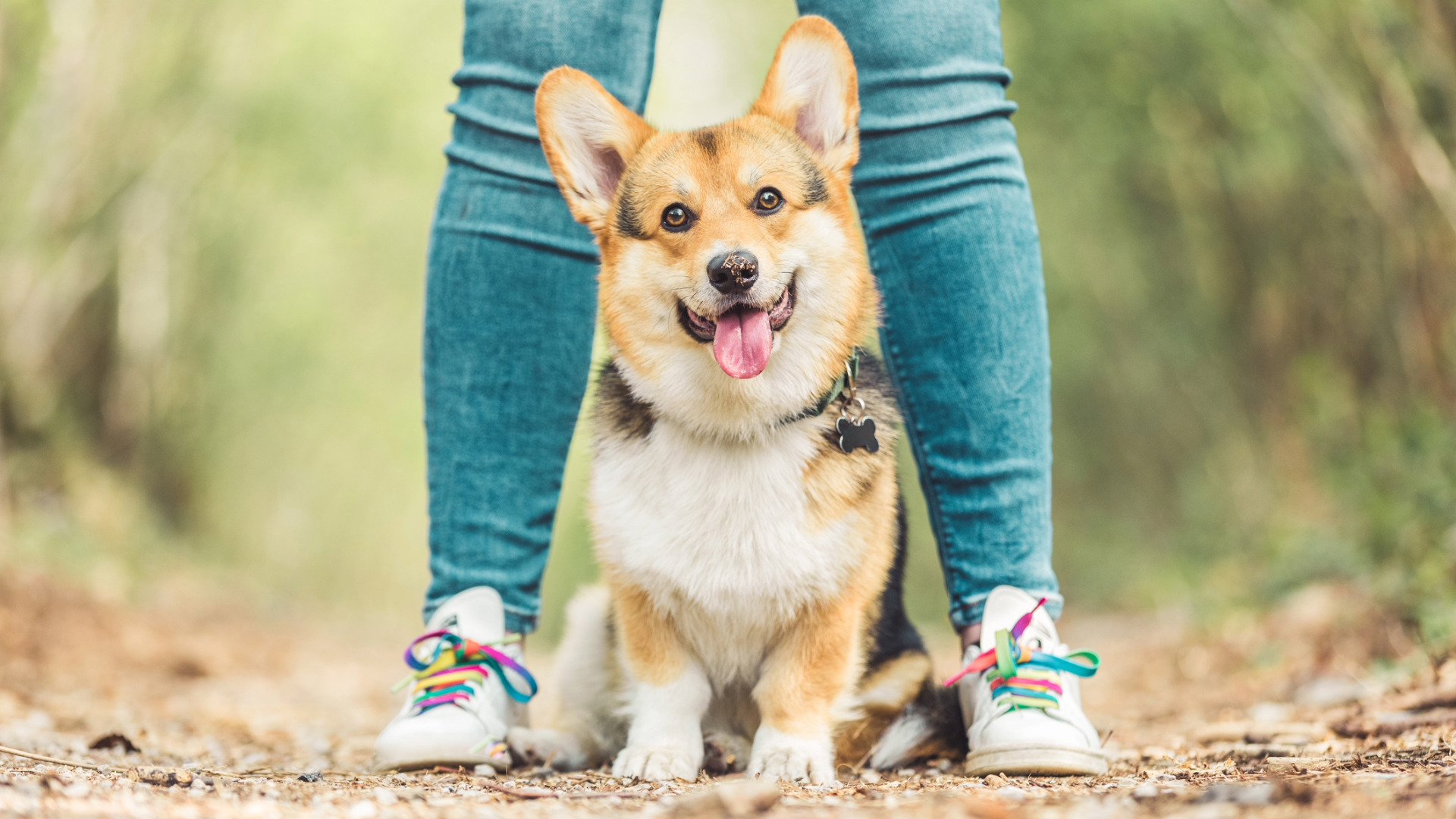
In stressful or new situations, your pup may choose to stand in between your legs, be right next to you or behind you, or sit on your lap. This shows that your dog feels more secure when they're close to you. According to a 2015 study published in the journal Psychology Research and Behavior Management, dogs may form attachment bonds to their human caregivers similar to that of a parent and child.
It's important to provide this closeness when your dog feels unsure so they know they can come to you for support, rather than feeling like they have to defend themselves or bolt from a new situation.
27. Wiggling
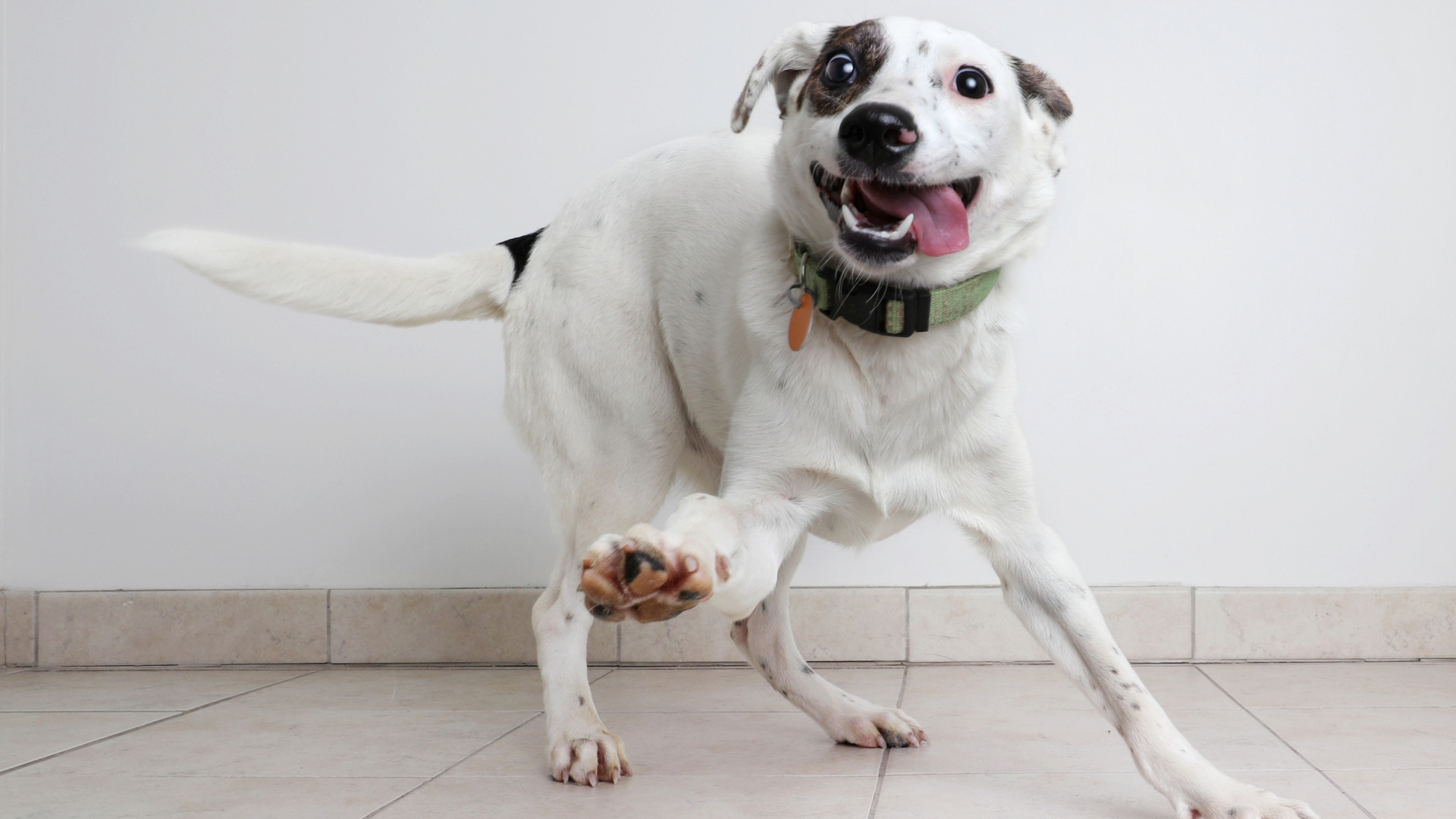
Some pups are delightfully wiggly when they're expressing their affection for their favorite person. A happy and wiggly pooch has loose body language and their tail is usually wagging in circles or big sweeps. Wiggling is one of the cutest ways that a pooch shows their affection and joy when around their favorite people. When excited to see their beloved human, some dogs only wiggle their hind end while others prance around and wiggle from head to toe.
28. Pawing at you
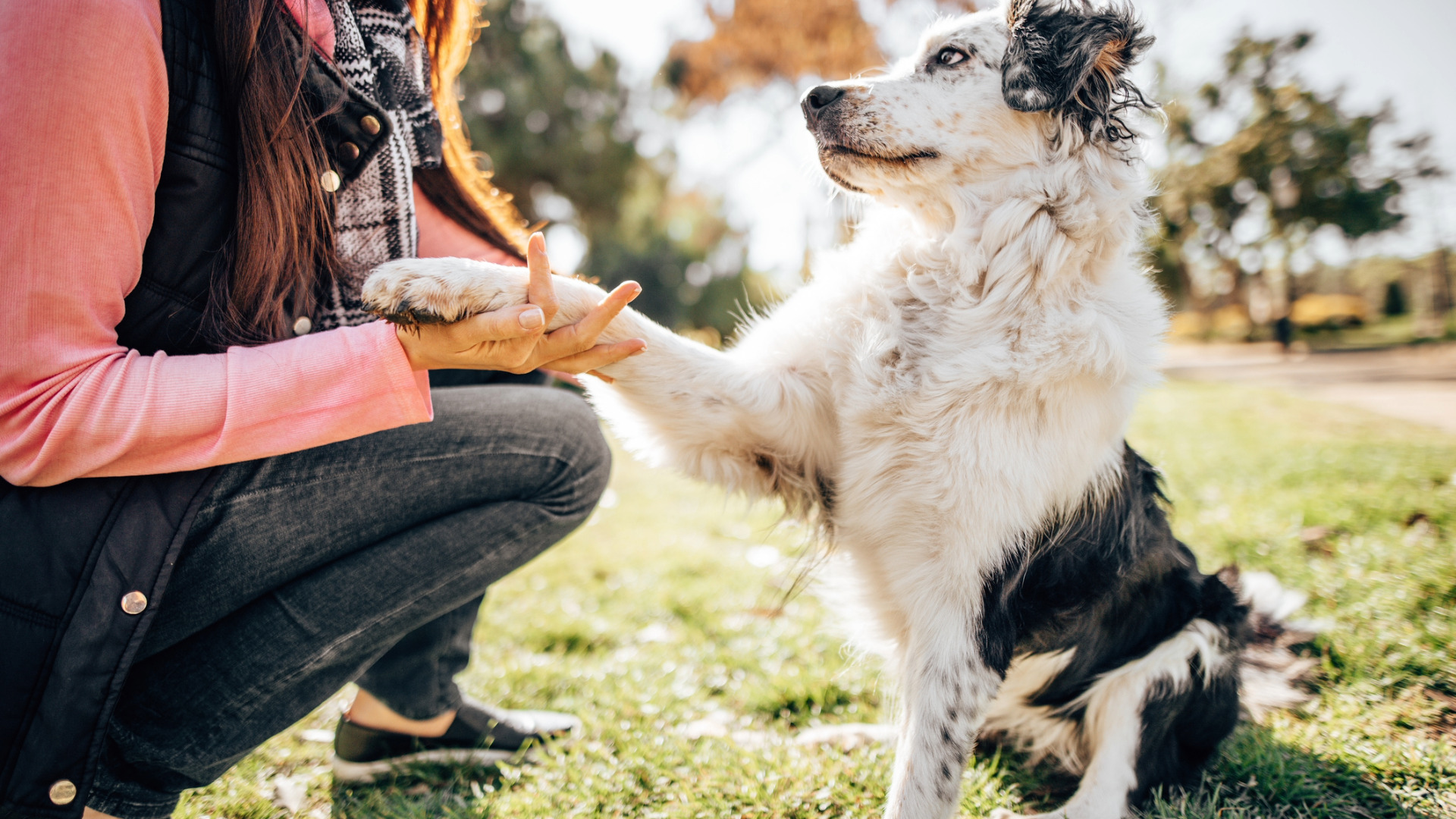
To get your attention or to express affection, your pup may paw at you or place their paw on you. Some dogs are especially communicative with their paws, and you may notice that your pooch expresses their affection with some well-placed paw smacks.
Additionally, some dogs paw at their humans when they're anxious and seeking assurance. As always, it's important to take the environmental context and full body language of your dog into account when assessing their behavior.
29. Licking you excitedly
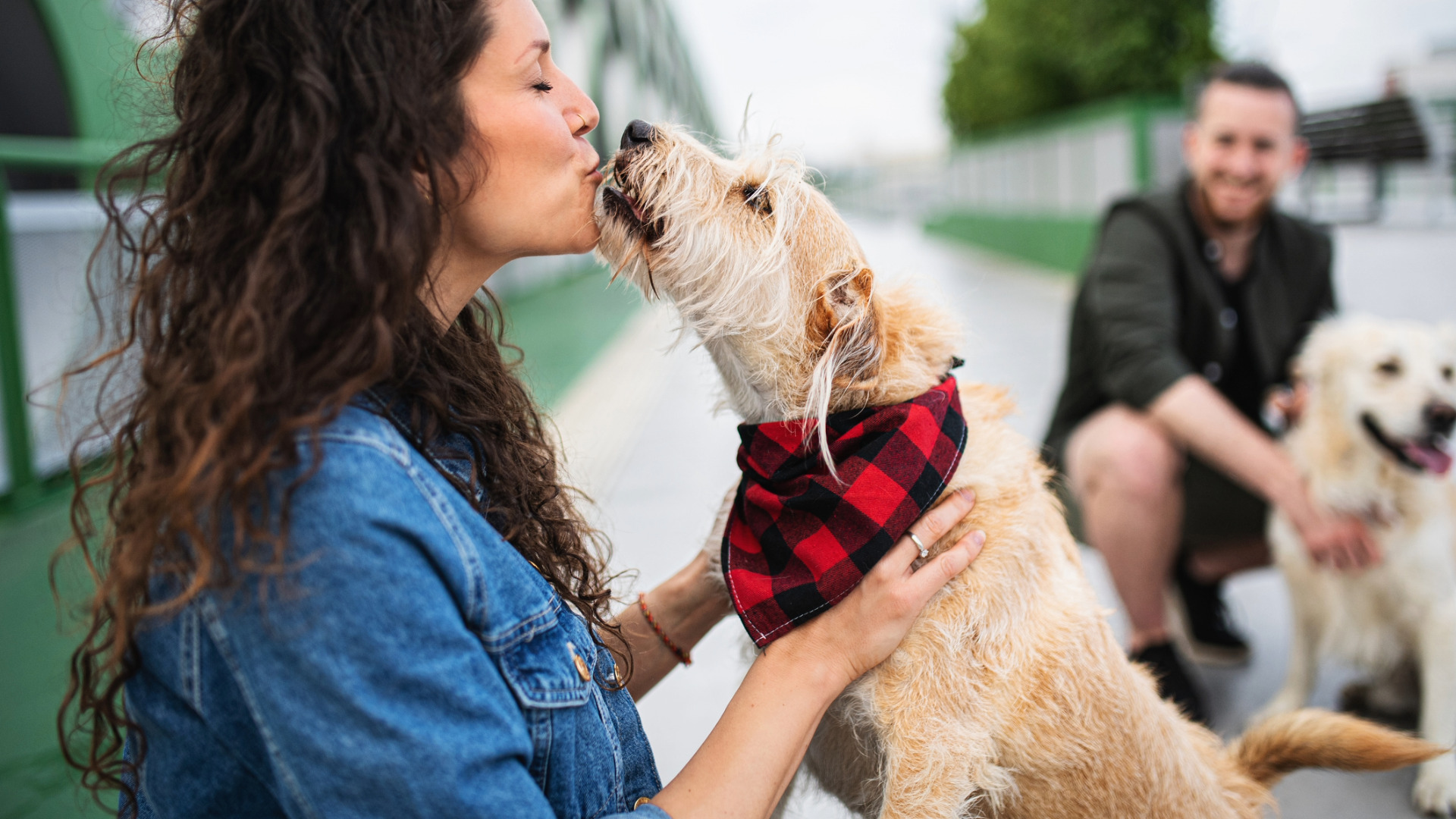
While dogs can lick people out of anxiety or appeasement, they can also lick to express affection. If your dog is excitedly licking you with loose, happy body language, this is a sign of their love for you. However, if you pull your dog's face towards you and they give you a short lick, this may be a sign of appeasement of request for space. This is especially true if your dog seems a bit resistant or tense when you hold their face. If a dog wants to lick your face to express their love, they'll usually do so without reservation.
30. Happy frolicking
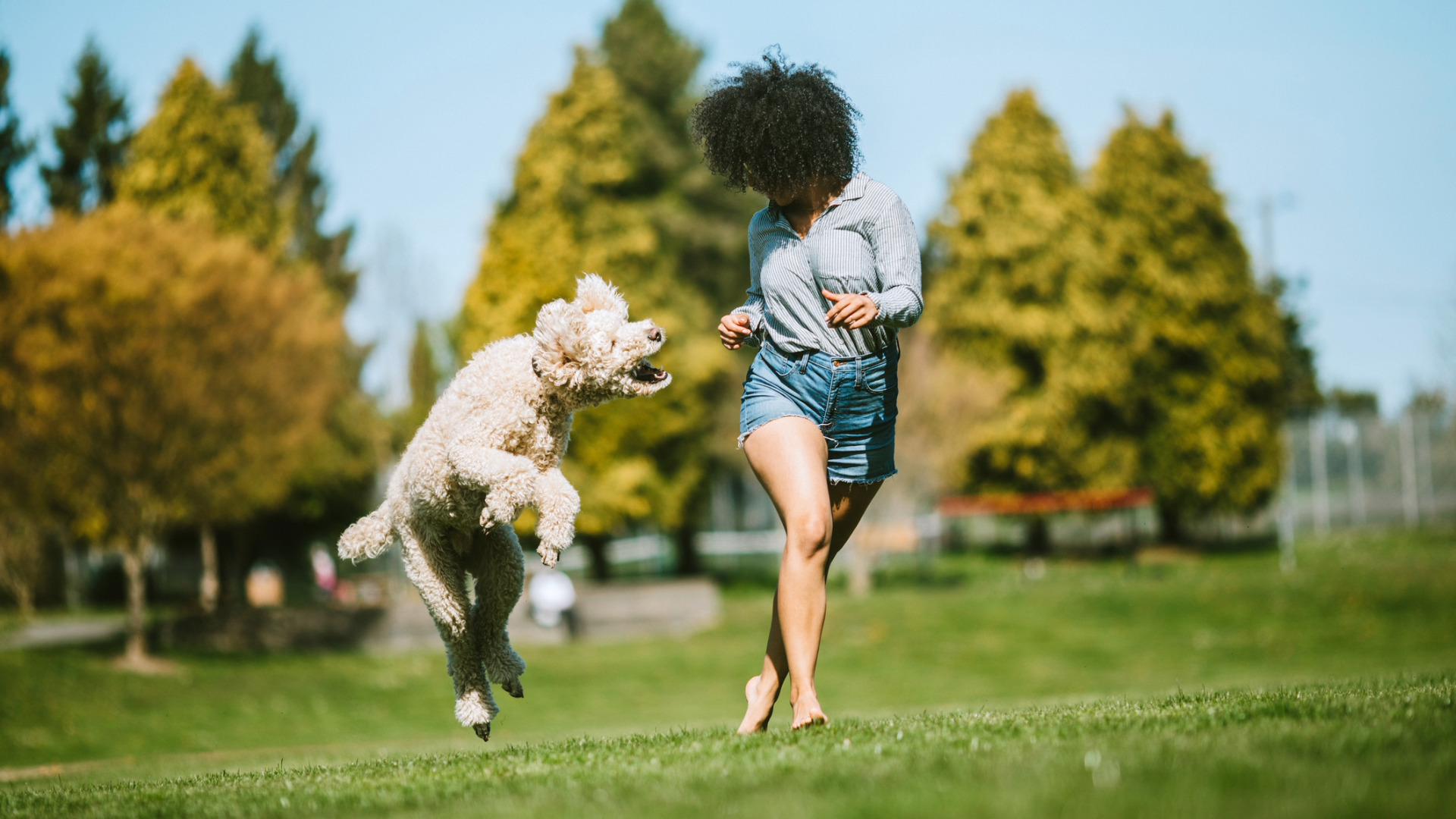
To express their affection, joy, or playfulness, some pups will frolic in a way that looks like energetic dancing. When your adoring dog is happy to see you, they may excitedly shuffle their front feet, throw themselves around, or bounce around your legs. There's certainly a range of ways pooches can frolic, and each pup seems to have their own unique way of showing off their happy feet.
31. Play bowing
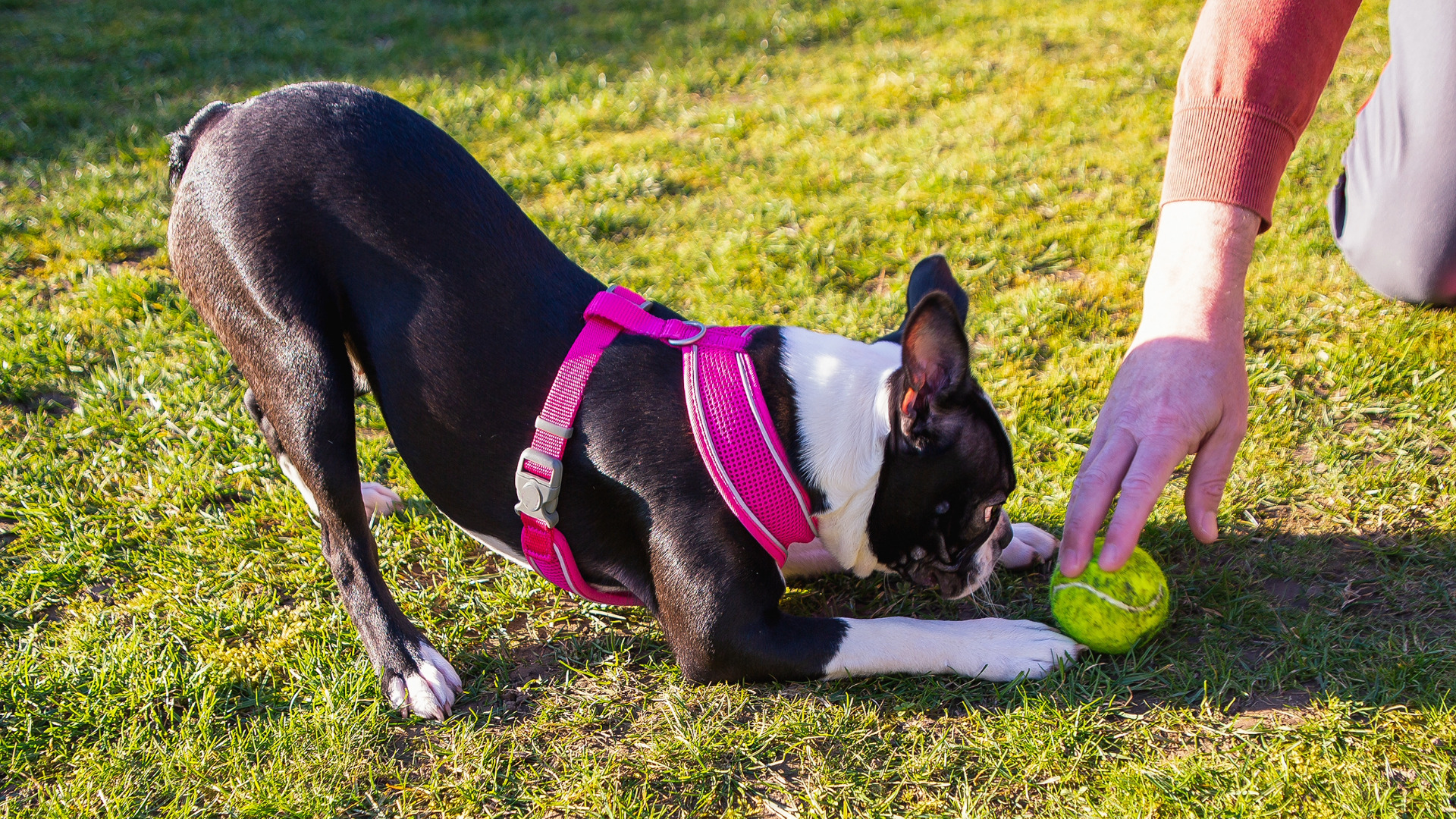
A play bow is an invitation to play. A dog stretches their upper body down so their chest and elbows are on or near the ground, their rear is in the air, and they're usually happily wagging their tail. Although play bowing is more commonly observed between dogs, they can use this signal to initiate play in dogs and people alike.
Delightfully, some pups will even respond to a person's play bow or similar movement with one of their own, usually before zooming around or barreling toward you.
32. Nuzzling their head into you
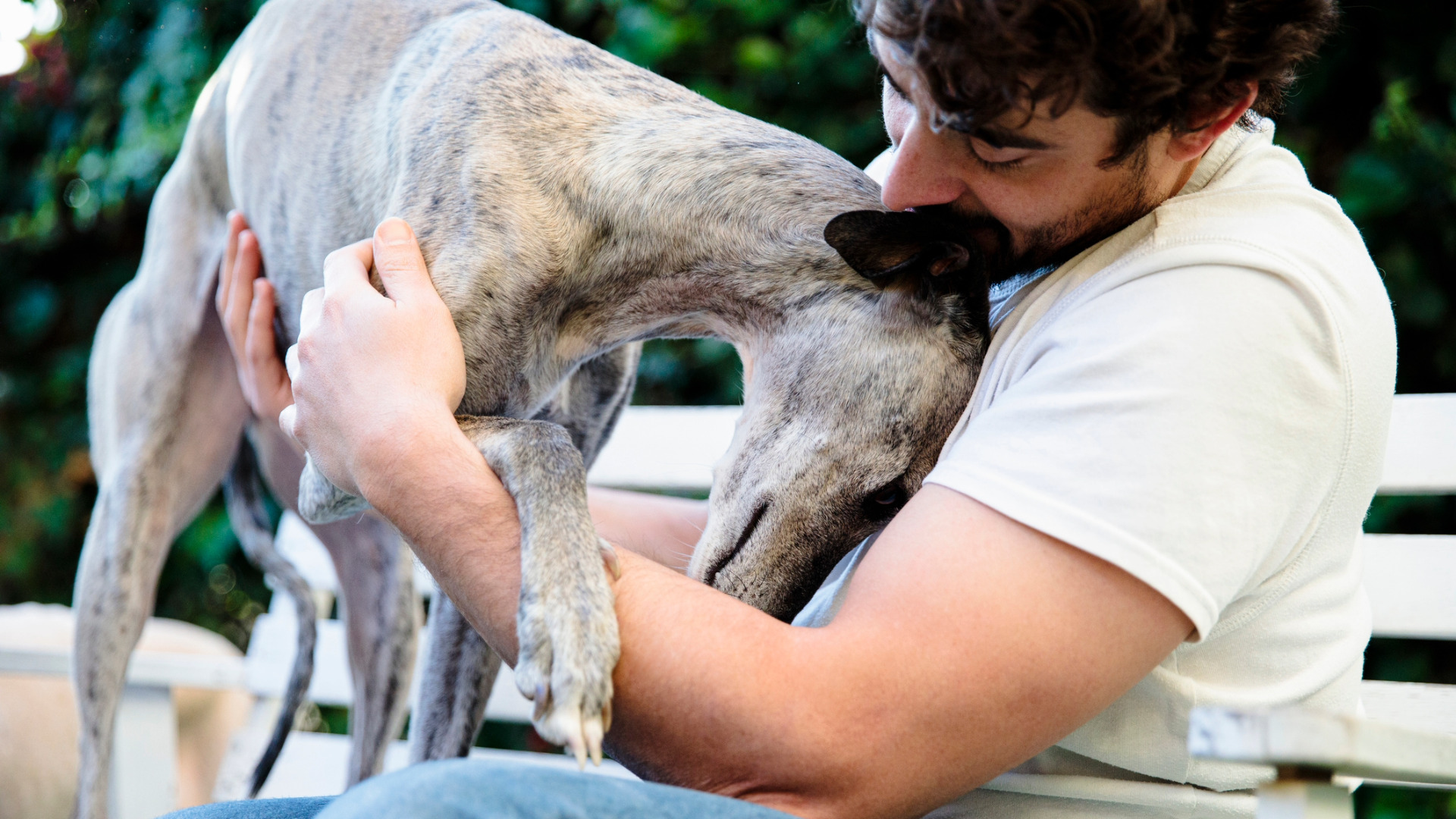
If you have an especially snuggly pup, they may show their love and trust for you by nuzzling their head against you. This type of affectionate pup may also prefer to sleep with their head nuzzled against their favorite person.
In general, dogs are social sleepers so it's not surprising that many dogs prefer to nap or rest with their head on the people they love the most. Some doggos also use nuzzling as a request for affection. These pups may push their head under your arm or hand to ask for pets.







